

Hey! Did you know that Leidos proudly supports Historically Black Colleges and Universities?





Hey! Did you know that Leidos proudly supports Historically Black Colleges and Universities?


We are committed to hiring qualified candidates with diverse perspectives and the skills necessary to solve our customers’ most demanding challenges. We’re seeking powerhouse talent in the areas of IT, engineering and science.
careers.leidos.com/USBE
At Lockheed Martin, inclusion drives success. We are proud to be named the lead Top Corporate Supporter of Historically Black Colleges and Universities (HBCUs) Engineering Programs for the ninth year in a row. Diverse backgrounds, experiences and points of view help us create incredible work, solve customers’ toughest challenges and engineer solutions around the world. We don’t know what’s going to change the world next. But we’re probably already working on it. Learn more at lockheedmartin.com/diversity
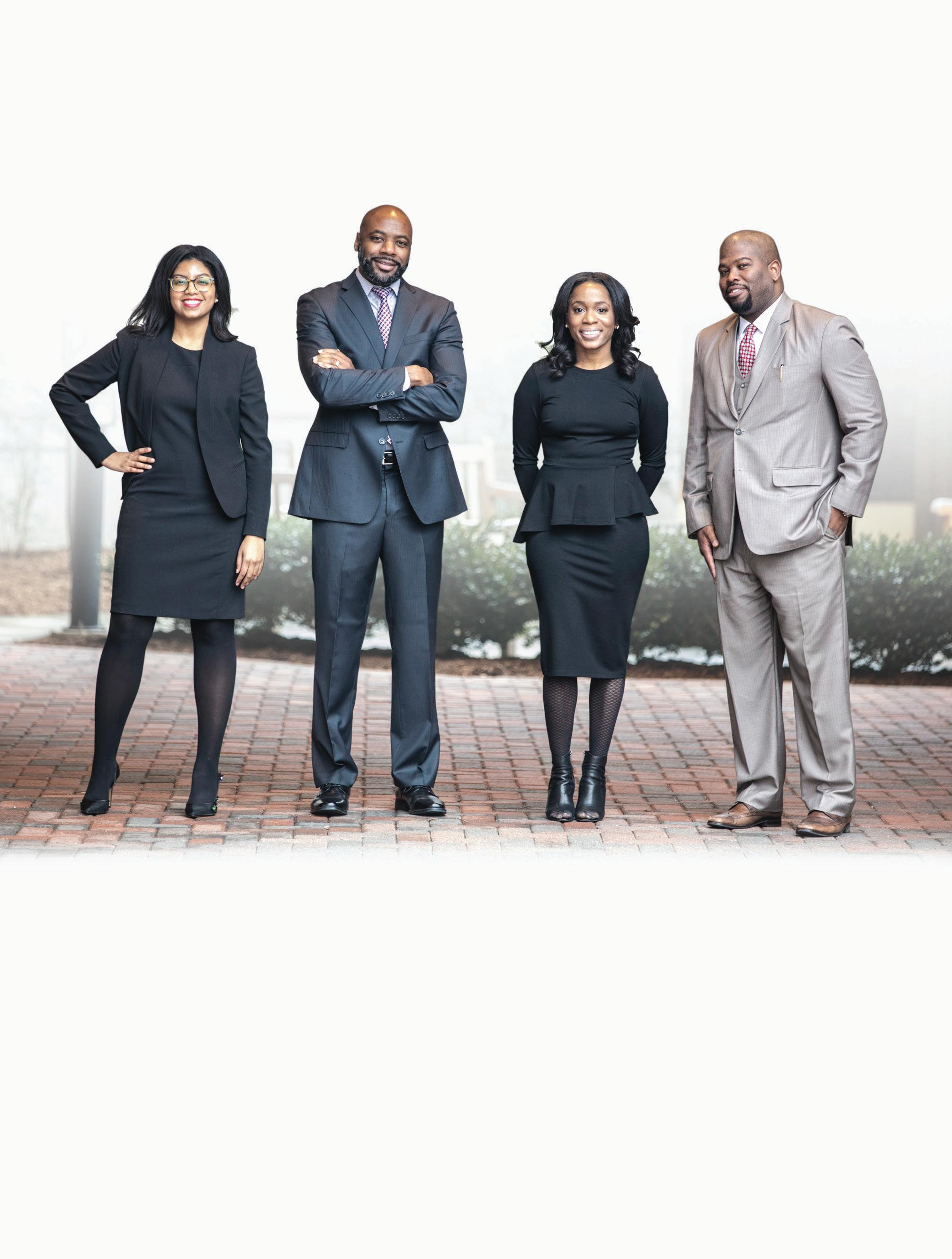
Get to know the dean of Hampton University’s School of Engineering, Architecture and Aviation. Dr. Joyce Shirazi grants USBE&IT magazine an exclusive interview to talk about her program and all that it has to offer.
LOCKHEED MARTIN’S COMMITMENT TO DIVERSE STEM TALENT 28 BEYA STUDENT LEADERSHIP - Check out the outstanding 2023 BEYA Student Leadership awardees! The future is bright with these bright stars leading the way! 35 TOP SUPPORTERS OF HBCUs - Since 2003, USBE&IT magazine has spotlighted the top supporters of our nation’s HBCUs. Check out the 20th-anniversary class with this year’s list! 38 THE 2023 HBCU ABET-ACCREDITED ENGINEERING SCHOOL DIRECTORY 56 BEYA38 RECAP - Did you miss this Year’s BEYA STEM Conference? Don’t worry, we’ve got you covered with this full event RECAP!
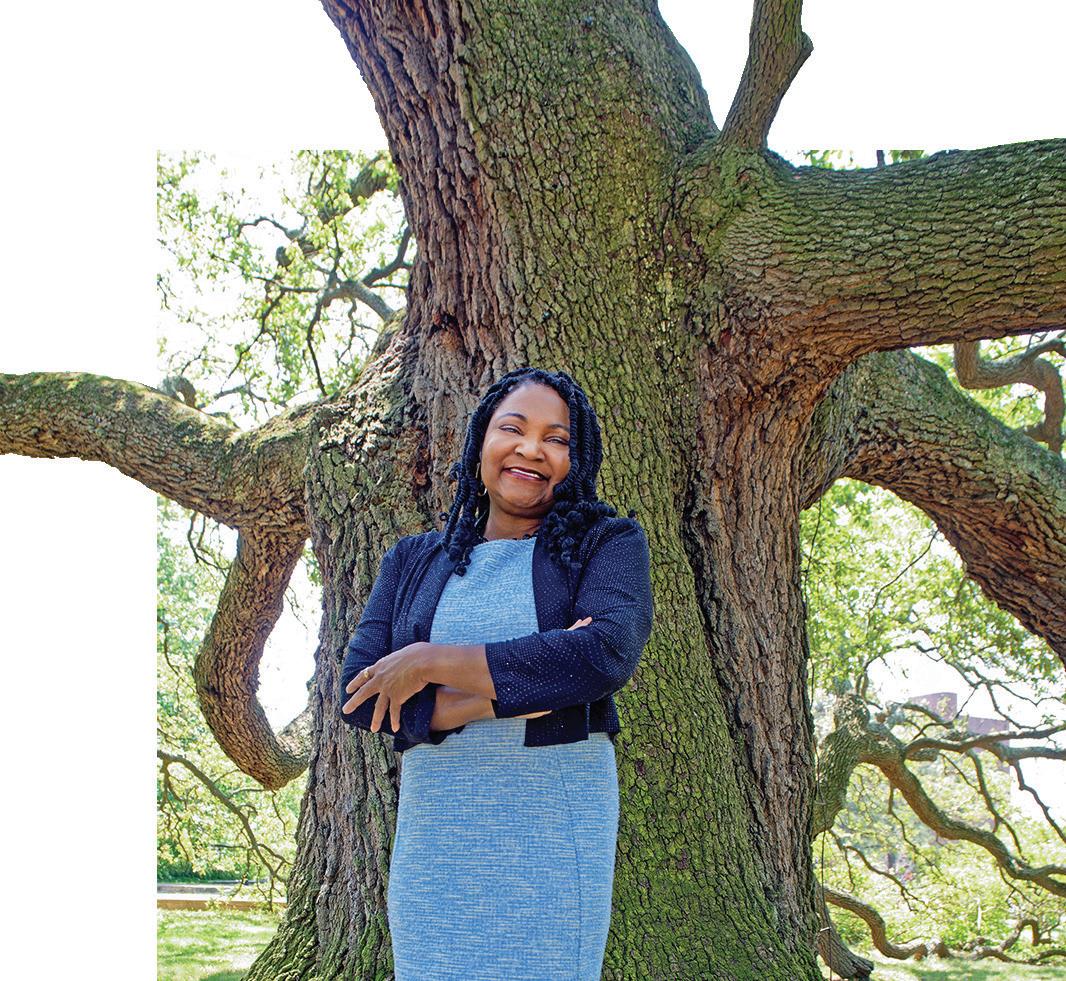
VOLUME 47 NUMBER 2
People and Events .............
8
Exciting highlights of recent promotions, breaking news on HBCU campuses, and major events happening in the STEM community.
One on One ......................
12
USBE sits down with the Leidos chief human resources officer to discuss the importance of promoting diversity in the engineering and IT fields.
Education ......................... 16

HBCU engineering deans discuss how their schools and corporate partners can best work together to benefit students.

Career Voices ...................
18
Top executives reflect on their careers so far and how they have overcome challenges and hardships to get where they are today, using every roadblock as a learning experience to help them become better leaders.
Corporate Life ..................20
When you are well-mannered and considerate in dealing with others, you create interesting, productive, long-lasting relationships. This article will discuss accepted business behavior and its importance in business correspondence.
Leading Voices ..................54
• Terrence Mosley: The HBCU Clean Energy Education Prize.
• Christine Burkette: Poised for Success: Believing in Yourself!
Career Outlook .................59 Artificial Intelligence
The 2022 White House Proclamation on National Historically Black Colleges and Universities Week had a clear message: Historically Black colleges and universities (HBCUs) and their alums make countless contributions to the United States.
According to the Thurgood Marshall College Fund, people of African descent were unwelcome at public and private higher education institutions, so HBCUs were established in the United States early in the 19th century. Since then, HBCUs have produced 25 percent of Black science, technology, and math graduates and 40 percent of Black engineers. Seventy percent of Black doctors attended an HBCU. And the female mathematicians who offered critical intelligence to NASA’s first human space flight were all HBCU grads.
US Black Engineer (USBE) magazine’s 2023 edition of the Top Supporters List recognizes organizations that have provided exceptional support to engineering programs at 15 ABET-accredited HBCU engineering schools. In addition, companies, organizations, and government agencies have provided outstanding support through scholarships, internships, and funding for R&D.
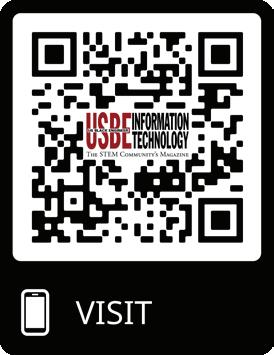
Nonetheless, public HBCUs are still in a situation where they must fight for funding, according to Rutgers professor Marybeth Gasman. In the 2022 Forbes report, Black land grants are estimated to have suffered $12.8 billion in underfunding over the last 30 years.
Examining and confronting disparities is also taking place in how artificial intelligence (AI) is developed and used.
That work is being done by Charles C. Earl, a math graduate from Morehouse College and a machine learning (ML) engineer at GitHub. In Earl’s paper, “AI at Historically Black Colleges,” he lists courses in AI and generative AI tools at several HBCUs. They include Morehouse, Howard University, North Carolina A&T, Florida A&M University, and Prairie View A&M University. In this issue, USBE offers new insights and perspectives on machines’ simulation of human intelligence in Career Outlook.
Tyrone D. Taborn Publisher and Chief Content Officer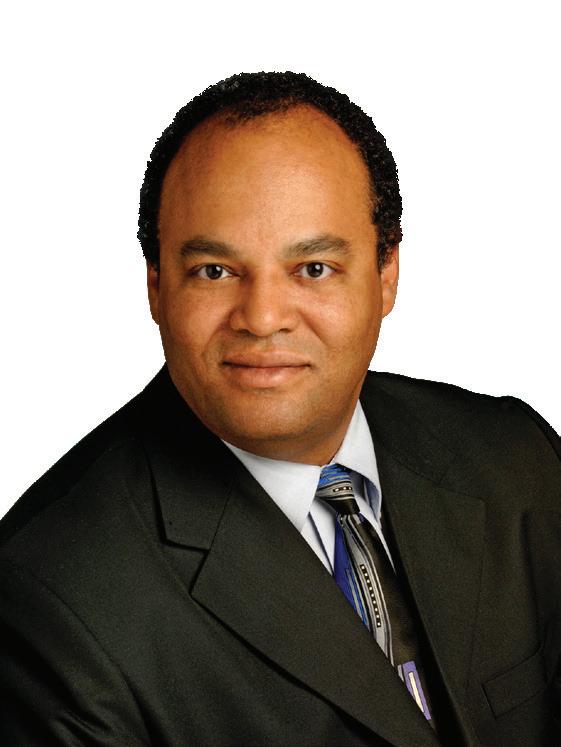
FEBRUARY 15-17, 2024
The38th
EXECUTIVE OFFICE
Tyrone D. Taborn, CEO and Publisher
Jean Hamilton, CFO, President
Ty Taborn, Esq., Executive Sr. V.P. & General Counsel
Kwan Hurst, COO, Operations
Alex Venetta, Exec. V.P. of Corporate Development
Eric Price, V.P., Human Resources
EDITORIAL AND CONTRIBUTING EDITORS
Rayondon Kennedy, Manager, Digital and Print Operation
Lango Deen, Technology Editor
Michael Fletcher, Contributing Editor
Gale Horton Gay, Contributing Editor
Garland L. Thompson, Contributing Editor
Roger Witherspoon, Contributing Editor
GRAPHIC DESIGN
Beverly Wladkowski, Art Director
Bryan Davis, Digital Director
Rachael DeVore, Multimedia Designer
Courtney Taborn, Digital Marketing Manager
DIGITAL PLATFORM DEVELOPMENT

Nikkie Stevens, Director of Metaverse Platforms
Abdul-Malik Mahmud, Director of Virtual Reality Programs
Terrence Fooks, Digital Platform Development Manager
CORPORATE AND ALUMNI RELATIONS
Dr. Gwendolyn Boyd, CCG Alumni Committee Chair and President
Dr. Eugene DeLoatch, Chairman, BEYA Alumni Group
Vice Admiral Walter J. Davis, USN (Ret.) National Chair, BEYA Military Alumni
Oliver “Bo” Leslie, Retired Program Manager, Historically Black Colleges and Universities/Minority Institutions, Boeing
Monica E. Emerson, Women of Color STEM Conference National Chair
Matt Bowman, CCG Military Program Manager, Stars & Stripes Committee; Executive Director/Chief of Staff for VADM Walt Davis, USN (Ret.)
SALES AND MARKETING
Gwendolyn Bethea, V.P., Corporate Development
Kameron Nelson, Account Executive
Elyse Holdaway, Account Executive
Lucille Kennedy, Sales Support Assistant
Jay Albritton, Social Media Specialist
Jessica Rafaeil, Communications Manager
JOBMATCH AND STUDENT DEVELOPMENT PROGRAMS
Ashley Turner, University Relations Manager
Rod Carter, Recruitment Specialist, College Relations
Shelia Richburg, College Coordinator
CONFERENCE AND EVENTS
Chantél Clea, V.P., Events and Strategic Branding
Tarase Whetstone, Executive Assistant
Ana Bertrand, Conference Coordinator
Jennifer Roberts, Customer Success Manager
Brandon Newby, Administrative Assistant
ADVERTISING SALES OFFICE
Career Communications Group, Inc. 729 E. Pratt Street, Suite 504, Baltimore, MD 21202

Phone: (410) 244-7101 / Fax: (410) 752-1837
www.beya.org
For more information, call us at 410-244-7101 Like us on Facebook: facebook.com/BEYASTEM Follow us on Twitter: @BlackEngineer
US Black Engineer & Information Technology (ISSN 1088-3444) is a publication devoted to engineering, science, and technology and to promoting opportunities in those fields. US Black Engineer & Information Technology cannot be responsible for unsolicited art or editorial material. This publication is bulk-mailed to colleges and universities nationwide. Subscriptions are $26/year. Please write to US Black Engineer & Information Technology, Subscriptions, 729 E. Pratt St., Suite 504, Baltimore, MD 21202. Copyright © 2023 by Career Communications Group, Inc. All rights reserved. Printed in the U.S.A.
Like us on Facebook: facebook.com/BEYASTEM Follow us on Twitter: @BlackEngineer

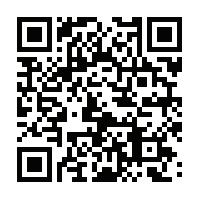
We're proud to support Historically Black Colleges and Universities (HBCUs). Through scholarships and internships, we're empowering future leaders in engineering and technology.



The American Society for Engineering Education is marking its 130th anniversary, working to improve all disciplines of engineering and engineering technology. The ASEE will hold its annual conference and exposition at the Baltimore Convention Center, MD, June 25–28. The conference will feature more than 400 technical sessions and thousands of authors and speakers, with peer-reviewed papers spanning all disciplines of engineering education, and workshops on topics ranging from new tools and technologies to research-proven, practical tips for improving teaching, learning, and equity.
Morgan State University Vice President of Research Willie E. May has been elected to serve as president of the American Association for the Advancement of Science (AAAS), the world’s largest general scientific society and publisher of the Science family of journals. May is expected to begin his term immediately as president-elect before becoming president on Jan. 1, 2024, and hold that position for one year. Past presidents include Shirley Ann Jackson and Gilda Barabino.
ADVANCING MINORITIES’ INTEREST IN ENGINEERING (AMIE) ANNUAL CONFERENCE
September 10-12, 2023
Washington, D.C.
www.amiepartnerships.org
WOMEN OF COLOR STEM
DTXTM CONFERENCE

October 12-14, 2023
Detroit, Michigan, and the WOC DTX Platform
www.womenofcolor.net
BEYA STEM DTXTM CONFERENCE
February 15-17, 2024
Baltimore Convention Center and the BEYA DTX Platform
www.beya.org
Alabama A&M University (AAMU) selected Dr. Zhengtao (Z.T.) Deng (second row, second from right) to lead the College of Engineering, Technology, and Physical Sciences in October 2022. Deng started his academic career at AAMU in 1992 in the School of Engineering and Technology (previous name of the College of Engineering, Technology, and Physical Sciences). He is one of the founding members of AAMU’s Mechanical Engineering program and is a full professor in the department.
North Carolina Agricultural and Technical State University announced Stephanie Luster-Teasley (front, center right) as interim dean of the College of Engineering in May 2022. A 2021 UNC Executive Leadership Institute graduate, Luster-Teasley was named N.C. A&T’s vice provost for undergraduate education in May 2021 after serving in the role on an interim basis from September 2020.

Florida A&M University and Florida State University also announced in May 2022 the appointment of Suvranu De (not in photo) as the new FAMU-FSU College
First-row L-R: Dr. Payam Matin, chair, Department of Computer Science and Engineering Tehcnology, University of Maryland Eastern Shore; Dr. Michelle Rambo-Roddenberry, associate dean of student affairs, FAMU-FSU College of Engineering; Dr. Lin Li, interim dean, College of Engineering, Tennessee State University; Dr. Stephanie Luster-Teasley, interim dean, College of Engineering, North Carolina A&T University; Dr. Joyce Table Shirazi, dean, School of Engineering, Architecture, and Aviation, Hampton University; Dr. Dawit Haile, dean, College of Engineering and Technology, Virginia State University. Second-row L-R: Dr. Wilbur Waters, dean, College of Science, Engineering, and Technology, Jackson State University; Dr. Patrick Mensah, associate dean, College of Sciences and Engineering, Southern University and A&M College. Dr. Michael Keeve, dean, College of Science, Engineering, and Technology, Norfolk State University; Dr. Oscar Barton, Jr., dean, Clarence M. Mitchell, Jr. School of Engineering, Morgan State University; Dr. Heshmat Aglan, dean, College of Engineering, Tuskegee University; Dr. Devdas Shetty, dean, School of Engineering & Applied Sciences, University of the District of Columbia; Dr. Zhengtao Deng, College of Engineering, Technology and Physical Sciences, Alabama A&M University; Dr. John M. M. Anderson, dean, College of Engineering and Architecture, Howard University. Not shown: Suvranu De, Sc.D. dean, College of Engineering, FAMU-FSU College of Engineering; Dr. Pamela Holland Obiomon, dean, Roy G. Perry College of Engineering, Prairie View A&M University; Dr. Patrick Carriere, dean, College of Sciences and Engineering, Southern University and A&M College; Dr. Yuanwei Jin, chair, Department of Engineering and Aviation Sciences, University of Maryland Eastern Shore
of Engineering dean. His first day was July 15 of the same year. De serves as the joint college’s chief academic and administrative officer as dean, overseeing academic affairs and research, including call centers, institutes, and educational services.
Dr. Lin Li (front row, center left) is a Tennessee State University civil and
architectural engineering professor. He has served as interim dean of the College of Engineering since January 2022. In addition, he served as an assistant, associate, and full professor of civil engineering at Jackson State University from 2005 to 2018. S
Corning is one of the world’s leading innovators in materials science. For more than 170 years, we have applied our unparalleled expertise in glass science, ceramic science, and optical physics to develop products that transform industries and enhance people’s lives. We succeed through sustained investment in R&D, a unique combination of material and process innovation, and close collaboration with customers to solve tough technology challenges.
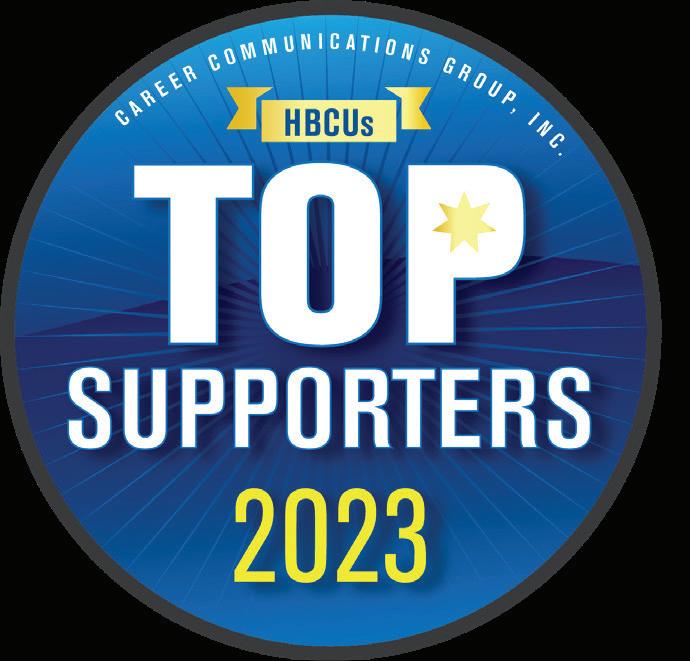


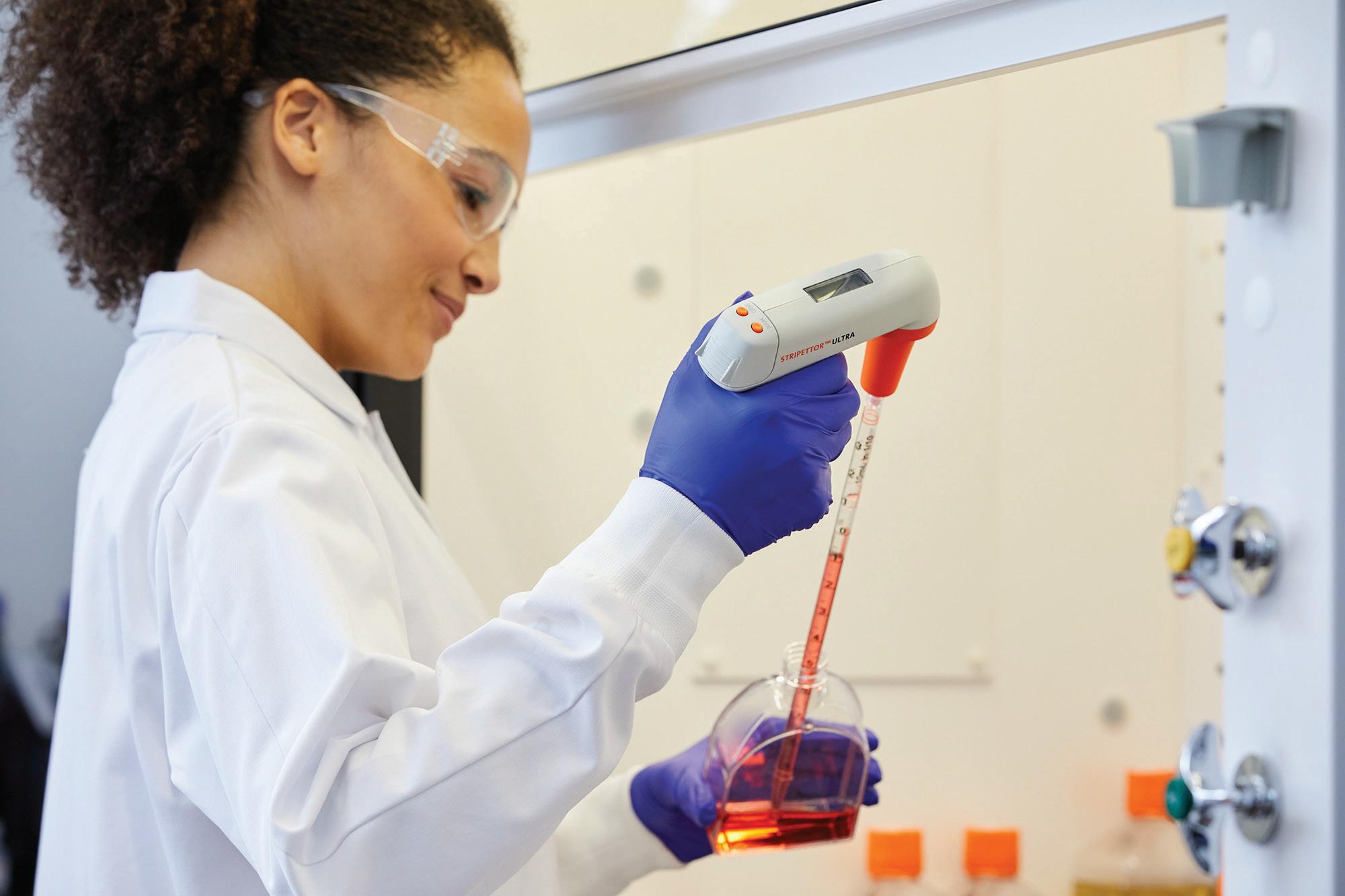


As one of the fastest growing global life science companies, Sartorius is part of the solution in the fight against Covid-19, cancer, dementia and many other diseases. This offers numerous opportunities for our people to grow with us and make an impact with their work.
Apply today at www.sartorius.com/careers
Sartorius is an Equal Opportunity/Affirmative Action employer and will consider all qualified applicants for employment without regard to race, color, religion, gender, sexual orientation, gender identity, national origin, age, protected veteran status, or disability status.

As the chief human resources officer, Maureen Waterston is responsible for the company’s talent strategy, including talent acquisition; employee development; and diversity, equity, and inclusion initiatives.

In this interview, she discusses the importance of promoting diversity in the engineering and IT fields, Leidos’ commitment to building a diverse workforce, and her journey to becoming a CHRO.
Leidos, a leading provider of information technology, engineering, and science solutions, is committed to building a diverse workforce and promoting inclusivity in the tech industry. Maureen Waterston, the chief human resources officer (CHRO) at Leidos, plays a pivotal role in shaping the company’s people strategy to foster diversity and equity in the workplace.
Waterston has a distinguished career spanning 30 years in all aspects of human resources. She brings a wealth of experience from working in different countries and cultures, which has shaped her approach to HR leadership.
In an interview with the US Black Engineer & IT magazine, Waterston shared her insights on Leidos’ commitment to diversity, equity, and inclusion and her journey to becoming
the CHRO at Leidos.
Waterston believes that all employees deserve to be treated fairly and with respect and should be encouraged to be themselves in the workplace. She emphasized that diversity is a top priority and focus for Leidos. The company’s people strategy focuses on diversity, equity, and inclusion to promote diversity in the engineering and IT fields.
Leidos was recently recognized among the top 15 HBCU Engineering School supporters. This recognition is a testament to the company’s values and signifies its partnership with the HBCU engineering programs. Waterson is
proud of this recognition as it signifies that Leidos is an employer that values diversity. The company’s partnership with the HBCU engineering programs impacts and supports its goals.
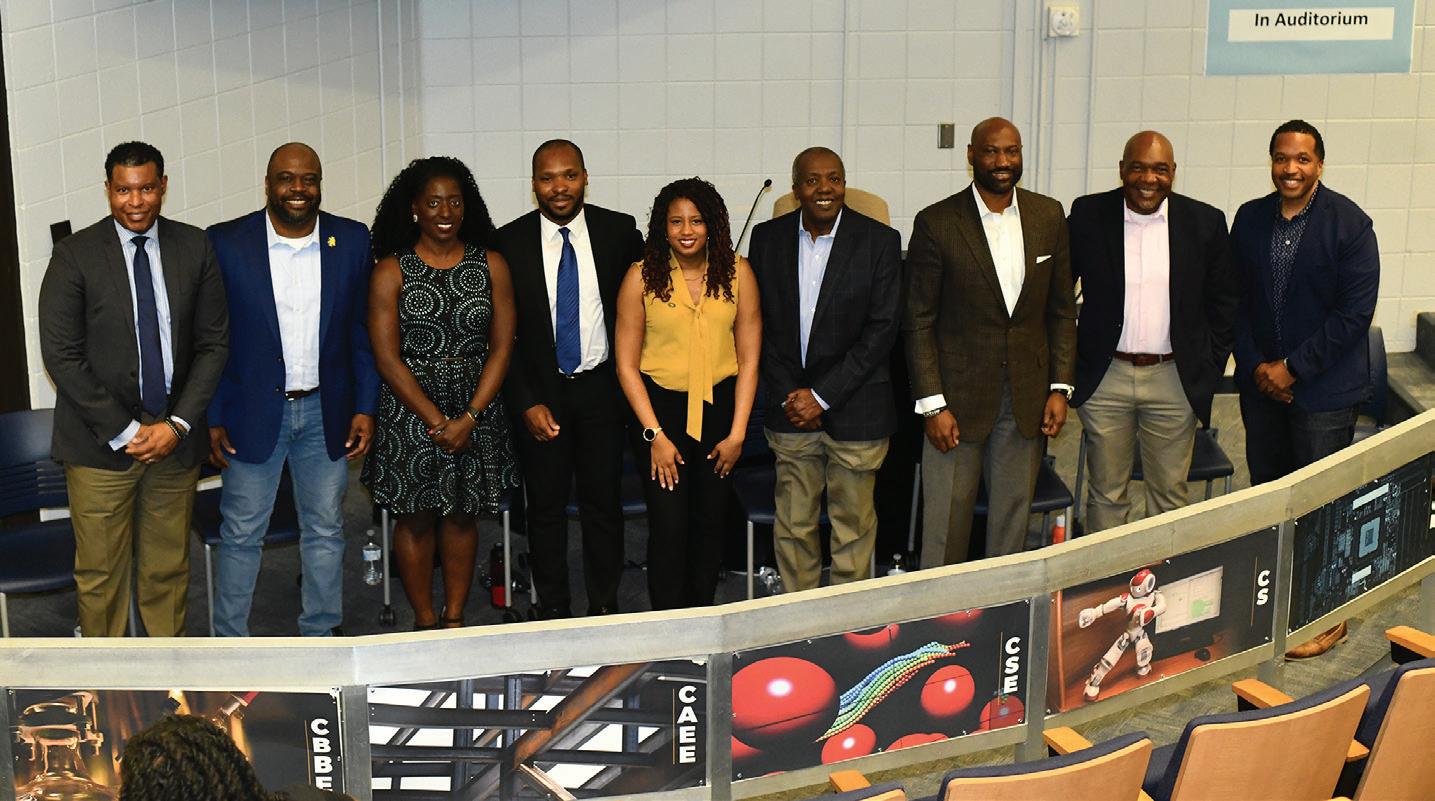

To ensure that Leidos’ HR policies and practices promote diversity and inclusivity, the company has implemented nine employee resource groups (ERGs). These groups allow employees to collaborate on shared interests and work to support diversity in the company’s culture. ERGs offer professional development, mentoring, networking, and community engagement opportunities, which support members and colleagues.
Waterston recognizes the challenges of promoting diversity and inclusivity in the tech industry, especially given the competition for technical talent. Leidos has implemented robust engagement strategies to address
Leidos was recently recognized among the top 15 HBCU Engineering School supporters. This recognition is a testament to the company’s values and signifies its partnership with the HBCU engineering programs.
this challenge to provide exposure to science, technology, engineering, and math (STEM) careers as early as elementary school. The company has established strategic partnerships with
FIRST Robotics and LINGO to promote STEM careers and foster connections between STEM professionals and students from various communities and backgrounds.
When asked about the key skills and qualities needed for success in STEM fields, Waterston highlighted the importance of “hard skills” and “soft skills.” While technical skills such as programming, coding, and capstone design projects are essential, soft skills such as communication, critical thinking, and working well with others are equally important. Waterson believes students can develop skills through internships/co-ops, student organizations, and STEM diversity conferences.
For young engineers and tech professionals starting their careers, Waterston advises looking for stretch assignments that force them outside their comfort zones. Companies do not expect new hires to know everything, but they do expect them to contribute. If they need help, they can find a
mentor or join an ERG to build their professional network and establish a sense of community and support. Looking ahead, Waterston’s goals for Leidos in promoting diversity and inclusivity are to leverage DEI as a differentiator in the marketplace, improve representation through robust talent pipelining, and continue building a culture that includes everyone. As Leidos works towards these goals, the company will provide equal opportunities for STEM professionals to develop and grow.
Maureen Waterston is an excellent example of a leader committed to promoting diversity and inclusivity in the tech industry. Her approach to HR leadership is shaped by her vast experience, which has influenced how she approaches everything related to people. At Leidos, diversity is a top priority, and the company continues to lead by example on the importance of creating a strong pipeline between HBCUs and STEM industries. S

Waterson is proud of this recognition as it signifies that Leidos is an employer that values diversity. The company’s partnership with the HBCU engineering programs impacts and supports its goals.
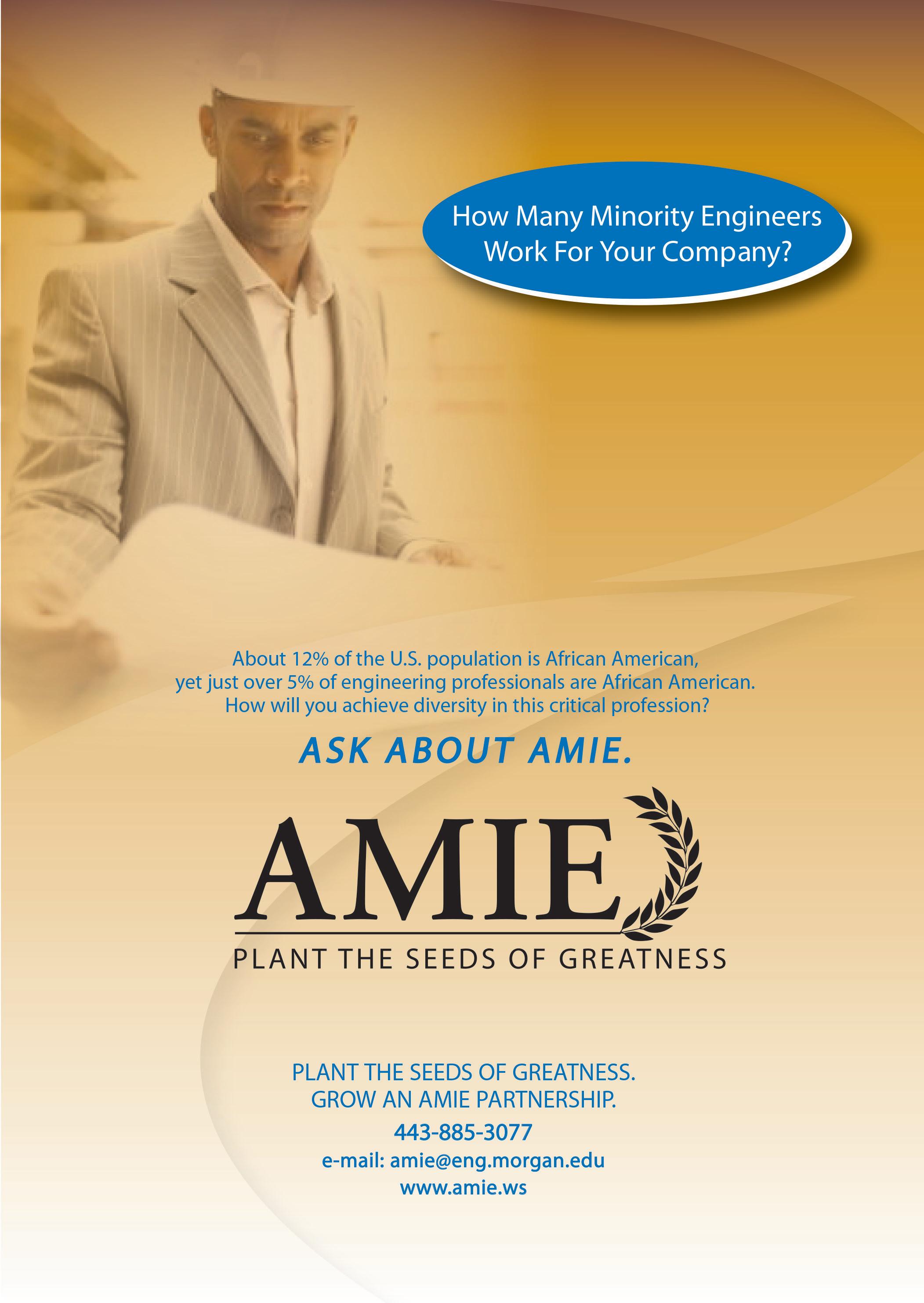

engineering and architecture at Howard University, agreed that establishing connections between external partners and faculty is key to a solid partnership foundation.
At the 37th Annual BEYA STEM Conference in February 2023, HBCU deans, acting deans, and deans’ representatives had a broad discourse focused on initiatives underway to get the most from those partnerships and what’s still needed to help students and their schools benefit at a superior level.
On how companies can develop high-impact partnerships with HBCUs, several deans offered a range of suggestions.
Carolina A&T University, said it’s inadequate for corporate partners to come to the school and recruit; they are expected to develop a thorough understanding of the institution. “We want companies to do more than come and recruit our talent,” said Luster-Teasley. “We want them to get to know us as a university—our faculty, our staff, how to engage with our department chairs, being involved with student organizations—and so we want companies to have a deep-level understanding.”
Dr. John Anderson, dean of
“I always try to get our external partners to be connected to our faculty members,” said Anderson. “If you want to stick deep tentacles into our college of engineering, our faculty and students, then really the faculty drive those relationships.”
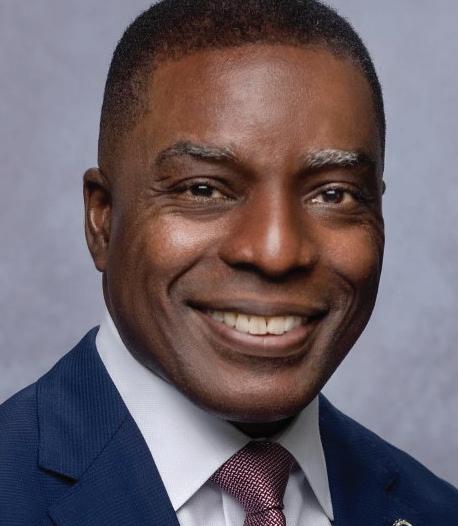
Anderson described one of Howard’s efforts as a “vertically integrated program” through which the engineering and architecture school has research projects and applications that corporate partners and students work across multiple years “so that ultimately students develop relationships with corporate partners.”
Anderson added that having targeted initiatives that are specific and concrete when working with partners is a positive driver to keep the momentum

When leaders of historically Black college and university (HBCU) engineering schools note the benefits and challenges of establishing and enhancing corporate partnerships, their discussions are insightful and wide-ranging.Dr. Stephanie Luster-Teasley, interim engineering dean at North Dr. Stephanie Luster-Teasley, interim engineering dean, North Carolina A&T University Dr. John Anderson, dean, College of Engineering and Architecture, Howard University Dr. Michelle Roddenberry, associate dean of student affairs, FAMU-FSU College of Engineering
going. He cited one company supporting a robotics lab and another a makers’ space.
Dr. Michelle Roddenberry, associate dean of student affairs at Florida A&M University and Florida State University College of Engineering, commented that, increasingly, students are asking about undergraduate research
opportunities. Recently, the school received a $1.5 million grant from Northrup Grumman to establish a STEM research and education program, she said. “About $500,000 per year is going to go to research projects led by faculty in areas of artificial intelligence, machine learning, cyber security, electrochemical energy storage devices, etc., and that will support about 11 graduate scholars and 27 undergrad scholars, and without that support how would we do those?” she said.
Roddenberry also said partnerships could benefit schools and students by mentoring, serving on advisory boards, judging student work and projects, funding student organizations, and giving students opportunities to problem-solve corporate issues.
Dr. Heshmat Aglan, dean of engineering at Tuskegee University, said developing and sustaining partnerships with industry requires “cultivation by both.”


He added that sponsoring undergraduate labs and allowing students to learn about “real-world problems” is immensely beneficial.
“Also, industry should help us to graduate more, hire more, increase our enrollment…,” Aglan said.

Dawit Haile, Ph.D., dean of engineering, science, and technology at Virginia State University, said HBCUs should “look into growing our faculty.”
He said that Virginia State University has a one-year master’s program in computer science, and they hire graduates from that program and introduce them to teaching.
“The reason young people getting their Ph.D. are not looking for teaching positions is they have no experience,” said Haile. “They don’t know how fulfilling that job is.” S
“If you want to stick deep tentacles into our college of engineering, our faculty and students, then really the faculty drive those relationships.”Dr. Dawit Haile, dean, College of Engineering, Science, and Technology, Virginia State University Dr. Heshmat Aglan, engineering dean, Tuskegee University
people overtly trying to run me out of the Academy because they didn’t think I deserved to be there,” he says, almost tearing up as he reflects on his youth. “Luckily, I had some people on my side who didn’t let that happen.”
Michael Spencer, Cedric Fletcher, and Lewis Pate are three men who understand this lesson very well. All executives for top technology companies, these men have overcome challenges and hardships to get where they are today, using every roadblock as a learning experience to help them become better leaders. The three executives were gracious enough to discuss their lives and share leadership advice at the recent BEYA STEM Conference. The panel was a helpful reminder that all experiences, both positive and negative, can add value to our professional lives.
For instance, Spencer, executive director for The Boeing Company, discussed the adversity he faced as a young Black man at West Point Academy in the 1970s. “There were
This made Spencer feel that he had to work harder than the other students to prove his value, an experience that prepared him for the rest of his career. “When I got to the Pentagon, no one was trying to run me out anymore, but my peers and I are all competing hard to make ourselves look the best,” he says. “We’re writing papers. We’re putting out articles. We’re doing as many interviews as we can to get noticed. I’d learned early on in life that if you want to stand apart, you have to be the first one in and the last one out.” This lesson was echoed by Fletcher, senior director for Microsoft, who recounted his experience as a young athlete growing up in Japan. “Not only was I the only American swimmer on my swim team,” he says, “but I was the only Black swimmer on my swim team. That prepared me a lot for my education when I went to engineering school as one of five Black students in the engineering program. It prepared me for my experience in the workforce when I graduated.”
He says that his experience as an athlete also taught him that you must work hard to stay competitive. “Competition gets more intense as you move into new environments,” he says. “You can be the best athlete in your neighborhood, but if you go across town, you might not be the best anymore. And if you travel across the state, you’re definitely not the best anymore.”
He says this is a particularly valuable lesson for STEM professionals. “No one is going to hand you anything,”
he says. “You can’t just say, ‘If I stay in this position for 25 years, I’ll eventually get promoted,’ because other people are sitting at their desks for 25 years, and you have to do something to distinguish yourself.”
Pate, chief of information security operations at CACI, explains that you must also be flexible, versatile, and willing to learn. He says he learned this lesson as a high school student when life circumstances forced him to pass on a college scholarship. “I had a partial scholarship, but Mom and Dad couldn’t help me with the rest because we were poor,” he says. “I didn’t even have enough money to buy a plane ticket or to support myself until that scholarship came through, so that dream died a painful death.
Instead, Pate joined the military, which he says taught him the value of being able to “pivot” when necessary. “It turned out to be one of the best decisions I ever made,” he says. “I got an education, I got out of the ‘hood, saw places, and met people. It was a painful decision, but I’m glad I did it.”
Fletcher doubles down on the value of being able to change paths when necessary, especially for STEM
Everyone faces setbacks and losses, and sometimes those obstacles can make it difficult to pursue our goals. But all experiences are just part of our journey, and if you learn from your setbacks, they’ll help make you a stronger leader in the future.
“When I got to the Pentagon, no one was trying to run me out anymore, but my peers and I are all competing hard to make ourselves look the best.”
professionals. After all, this industry is constantly evolving, and professionals must grow and evolve with technology to succeed. “You have to watch where tech and business are going, and you



have to prepare yourself to go in that same direction,” he says. “The game is going to change, and you have to learn to change with it.” S
To watch this full session, visit us here: https://youtu.be/VGKYbbWl7-o



Career Communications Group (CCG) has celebrated engineering deans from HBCUs in the past, but who are the other deans? Here are five deans who are playing a key role in the representation and development of their students. Success in any industry relies on relationships. When your co-workers and company leaders think highly of you, you’ll have more access to promotions and other opportunities. While talent and work ethic will help you build a positive reputation with your colleagues, professionalism is just as important. After all, your boss is unlikely to suggest you for a promotion if they aren’t confident in your ability
to represent your department in meetings. They must know that you’ll make them look good for hiring you. So what does it mean to demonstrate professionalism in a business setting? What does good business etiquette look like in the STEM fields? We recently gathered three esteemed tech professionals for a panel discussion on this topic, and they brought some very useful tips for our audience. To start, the panelists discussed the importance of introducing yourself effectively.
“When you meet someone for the first time in business, you need to make sure that you’re making a positive impact on them,” says the panel’s moderator, Celena Noel of IBM. “That way, you
can start building a connection right from the beginning of the relationship.”
According to panelist Victor Brown, also of IBM, one way to make a good impression is to make sure you remember the name of every person you meet at work. “It makes people feel important to know that you know their name,” he says, “especially if you’re interacting with people who work at a lower level than you who might assume that you don’t think they’re important.” He suggests repeating a person’s name frequently during your first interaction.
“If I meet a man named John, I’ll say something like, ‘Hi John, my name is Victor. It’s nice meeting you.’ And then I’ll repeat it as often as possible while
we’re speaking.”
The panelists also discussed the role that attire plays in business etiquette. Good etiquette, the panelists agree, means being able to dress appropriately for any business function.
“Different types of work engagements require different dress,” Noel says. “You’ll take a different approach when going out for a job interview than what you wear to your workplace. Those things will all affect the impression you make.”
Just as your outfit might change based on the situation, your behavior will too.
As Sondia Christian of Huntington Ingalls Industries (HII) points out, different cultures have different rules and norms. Thus, if you’re traveling, you should do your best to learn the etiquette rules of your destination before you arrive.

“Research the customs of the place you’re visiting,” Christian says. “When in Rome, you must operate the way Romans do. You never want to offend anybody, so you should do what you can to respect their customs.”
Of course, kindness and respect
transcend all cultures, and treating your colleagues with both is always important, no matter how stressful work gets.
Christian says this applies even to situations in which someone is rude or disrespectful toward you. “You can’t control how other people act towards you, but you can control how you behave in response,” she says, “At the end of the day, you want to leave every conversation knowing that you acted professionally no matter what. You don’t have to be rude just because someone else was.”
After all, people are always watching how you respond to situations at work, and your response today could affect your future opportunities. In stressful situations, demonstrating a calm, professional demeanor is one way to show your company’s leaders that you can handle bigger responsibilities.
As Christian puts it: “Every single day, conversations are happening that you’re not privy to and don’t even know about. People are talking about you, and you can control your narrative by always maintaining good business etiquette.” S
To read more great stories like this, check out our page at: www.blackengineer.com
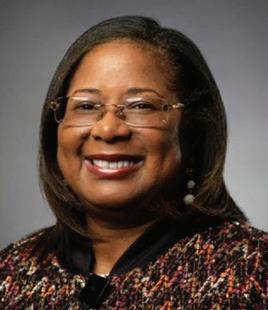
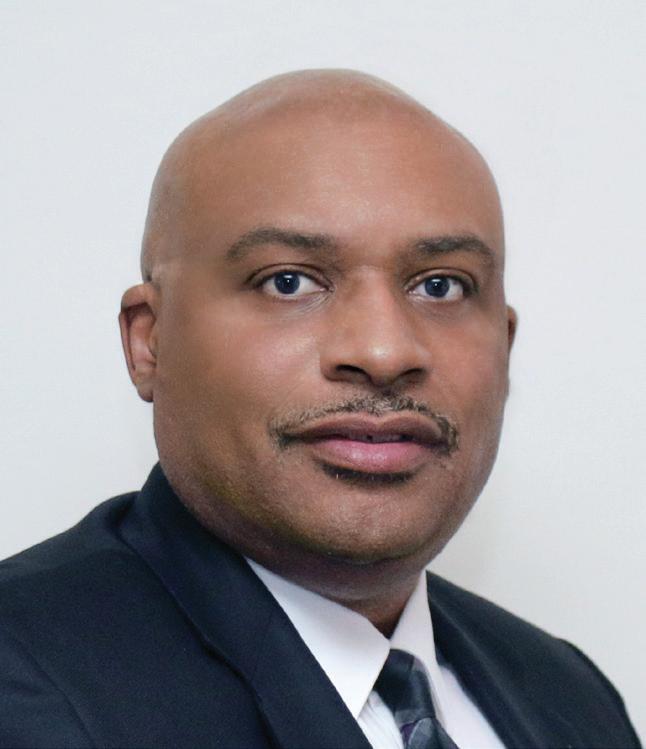

Kindness and respect transcend all cultures, and treating your colleagues with both is always important, no matter how stressful work gets.Celena Noel, Program Manager & Senior Managing Consultant IBM Corporation Victor Brown, Vice President and CTO IBM Corporation Sondia Christian, Director, Business Integration Huntington Ingall Industries
The Air Force Research Laboratory (AFRL) provides unparalleled research and technology solutions for both the Space Force and Air Force. When others say its impossible, AFRL finds a way. Join our team to lead, discover, develop and deliver tomorrow’s technology.




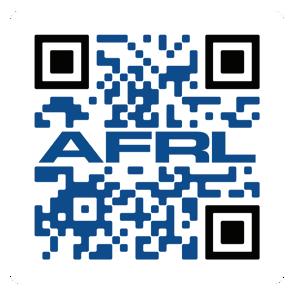





Remarkable.
We believe your career should be meaningful and empowering. And that’s exactly what you’ll find at BAE Systems. As you work to defend national security and protect livelihoods, you will know what it means to have the freedom and flexibility to reach your true potential. Make your mark at BAE Systems.

Find a career that’s meaningful and empowering at jobs.baesystems.com



The pursuit of diversity and inclusion has never been more critical in the fields of science, technology, engineering, and mathematics (STEM). In a world where technology is advancing at an unprecedented rate, the STEM industry must reflect the diversity of the society it serves.
One company leading the charge in this mission is Lockheed Martin, a global leader in aerospace and security. Its commitment to promoting diversity and inclusion in STEM is evident in its partnerships with historically Black colleges and universities (HBCUs). In fact, they have secured the #1 ranking among the Top Supporters of HBCU Engineering Schools for nine years since its inception. In fact, 2023 marks the 10th year Lockheed Martin ranks in the number one spot.
USBE spoke with a few of the leaders at Lockheed Martin on its recent recognition as one of the top supporters of HBCUs. Stephanie Hill, executive vice president of Rotary and Mission Systems; Rhom Erskine, vice president of Global Diversity and Inclusion; and members of the Lockheed Martin Talent Acquisition team provided insights into how Lockheed Martin measures the success of its HBCU partnerships, ensures the growth of HBCU hires in STEM positions, and promotes diversity and inclusion more broadly.
Lockheed Martin considers HBCU partnerships critical to building a diverse talent pipeline. According to Lockheed Martin corporate vice president, Talent Acquisition John Heyliger, the company

tracks the number of applicants and hires from each school but also evaluates the success of these partnerships in terms of the overall impact on the school and early career talent pipeline. In addition, Lockheed Martin offers mentoring, workshops, sponsorships, research funding, and career coaching to HBCU students.
Erskine knows firsthand the importance of building a diverse pipeline of STEM talent. Having graduated from Morehouse College and Clark Atlanta University, HBCUs hold a special place in his heart. He knows the immense value that these institutions provide in fostering students’ development and preparing them for successful careers
in the workforce. He has even seen the impact on his family members, as his parents both attended Alabama A&M University and his son is a recent graduate of Hampton University.
For both Erskine and Hill, this commitment to HBCUs and promoting diversity, equity, and inclusion in STEM is not just a matter of business success but also national and international security. Erskine emphasized the need to build a workforce representative of society and


Lockheed Martin’s commitment to promoting diversity and inclusion in STEM is evident in its partnerships with historically Black colleges and universities (HBCUs).
how the talent from HBCUs significantly impacts Lockheed Martin’s ability to accomplish its mission to solve complex challenges, advance scientific discovery, and deliver innovative solutions that help its customers keep people safe. Most importantly, these strengthened partnerships create an opportunity for economic empowerment by closing the wealth gap for underrepresented minorities.
Hill also spoke on her personal opportunities in working with Lockheed Martin’s HBCU programs. “I have the privilege of being our company’s executive sponsor for Morgan State Universit—an HBCU in my hometown of Baltimore and my father’s alma mater!” said Hill. “We work with their engineering programs to provide students and faculty with access to our company’s STEM professionals and opportunities to work with them on real-world projects.”
Lockheed Martin also has a major recruiting presence at the career fairs during the BEYA STEM Conference, Great Minds in STEM, and other events geared toward diverse populations of people seeking career opportunities with technology companies.
Erskine shared one of his favorite quotes he carries with him in his career, “Don’t take the fruit if you don’t want to tend the soil.” This is a beautiful visual of the importance of nurturing the talent that comes through the HBCU pipeline.
The company invests heavily in the professional development of its HBCU hires. First-year employees participate in a year-one onboarding experience to increase familiarity with the company structure, culture, and resources. The company offers virtual learning and in-person professional development training and provides meaningful work to interns focused on working alongside the engineering team as true partners. Mentoring, professional development, and coaching programs are also available to interns.
“Their education doesn’t stop after graduating,” shared Erskine, “and we
want to ensure that our team members thrive after hiring.”
Lockheed Martin promotes diversity and inclusion in the broader STEM industry through partnerships with minority-serving institutions, HBCUs, and national diversity organizations. The company provides funding, speakers, and workshops for student and professional organizations and has

business resource groups dedicated to providing professional development, mentoring, and leadership development for underrepresented communities. “We have BRGs for all sorts of communities within our company—

people of color, women, people with disabilities, LGBTQIA+, and even military veterans,” Hill said. “Our BRGs have the support of our entire Executive Leadership Team. Since 2021, I’ve had the privilege of serving as the executive sponsor for our Women’s Impact Network. And for about a decade prior to that, I was the executive sponsor for our Black Excellence Council.”
The company also works closely with its HBCU partners to anticipate student interests, challenges, and needs and to advance industry-recognized curriculum and work-based opportunities.

Lockheed Martin’s unwavering longterm commitment to its HBCU partners ensures that these partnerships will
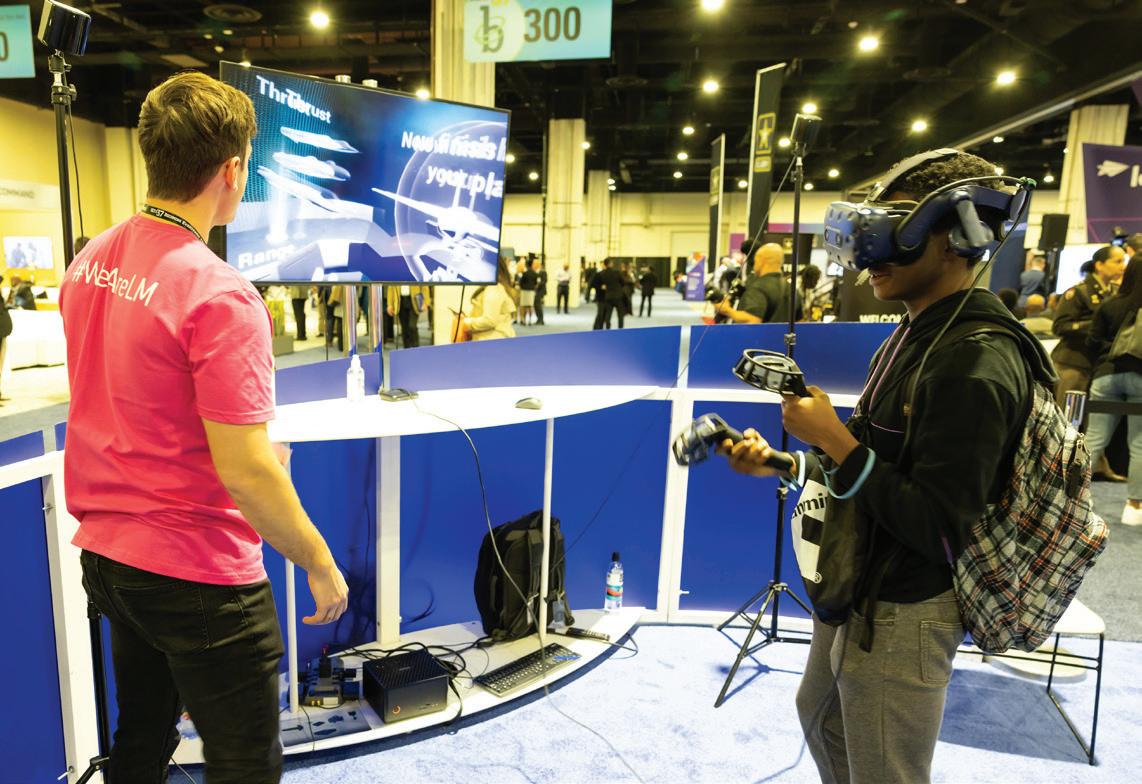
continue into the future.
Lockheed Martin’s commitment to diversity, equity, and inclusion through its partnership with HBCUs is commendable. The company’s emphasis on investing in the professional development and growth of HBCU students and alumni shows that it recognizes the value of a diverse workforce and is dedicated to creating an inclusive environment.
“When you have a diverse team and an inclusive work environment, you have the foundation you need to create a sense of belonging for every team member,” said Hill. “That’s what we strive for every day—to maintain a culture where every team member is empowered to be their best self and they feel psychologically safe to take risks and respectfully challenge the status quo in a shared mission to deliver the best possible outcomes for our customers and our company.”
As the company continues to strengthen its relationship with HBCUs and explore new partnerships and initiatives, it is clear that Lockheed Martin is committed to building a robust pipeline of diverse STEM talent for years to come. By prioritizing these efforts, Lockheed Martin is not only creating a better workplace, but also making a positive impact on our society. S

For 12 years, Career Communications Group (CCG) has taken great pride in recognizing top students’ hard work, dedication, and achievements via the BEYA Student Leadership Awards. The honors are bestowed in six categories:
Student Academic Award
Student Research Award
Student Military Leadership Award
Student Leadership Award
Student Community Award
Student-Athlete Award
The awards serve two critically important purposes—deserving students have a spotlight on them while they are still in an academic environment and are brought to the attention of organizations that may be future employers. The recognition challenges students to contemplate and articulate their successes.
We introduce the 2023 BEYA Student Award winners:

Howard University
Olabisi Bello, who graduated with a bachelor’s degree in chemical engineering from Howard University in June 2023, received the BEYA Student Leadership Award earlier in the year. Bello moved to Washington, D.C., from Nigeria in 2019 to attend Howard. She became a member of the National Society of Black Engineers, Tau Beta Pi, American Institute of Chemical Engineers, and Toastmasters International. Under her leadership as chapter president of the Society of Women Engineers, the chapter membership grew by more than 330 percent and the national membership by more than 200 percent. “Olabisi is a gem with a heart and passion for service and leadership that is dipped in elegance and excellence,” stated Dr. Ivory M. Berry, assistant dean for student affairs and director Office of Student Services, Howard University College of Engineering and Architecture, in a letter nominating her for the award.


Alabama A&M University
BreZhané Walker was a senior at Alabama Agricultural and Mechanical University (AAMU) when she was recognized as BEYA Community Award winner in 2023. “Ms. Walker brings Alabama A&M University a record of exceptional leadership and strategic vision with community educational system,” wrote Dr. Mebougna Laze Drabo in a letter to nominate her for the award. The mechanical engineering
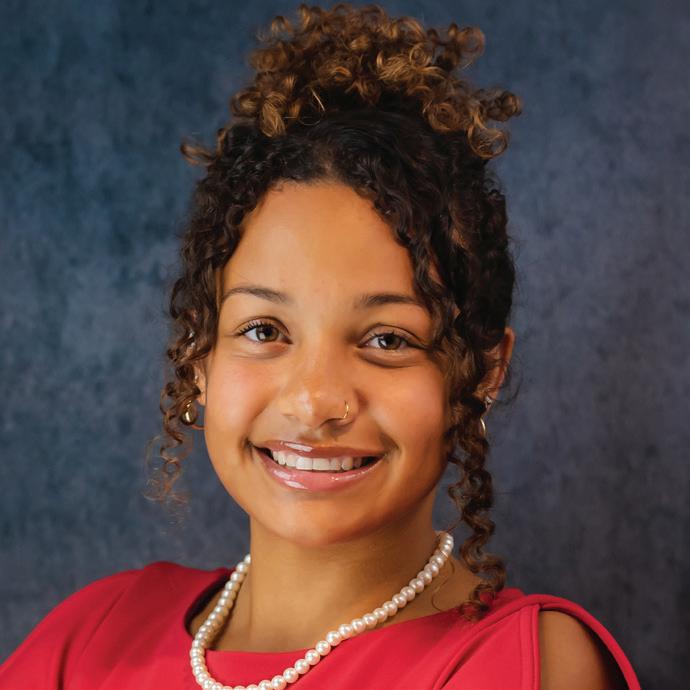
major set her sights on earning a Ph.D. in biomedical engineering. Laze Drabo, associate professor and interim chair of AAMU’s College of Engineering, Technology, and Physical Sciences, noted that Walker had received a fellowship to fully fund her pursuit of an advanced degree at any University of California institution. Walker has served as vice president of the National Society of Leadership and Success and outreach chair of the AAMU Robotics Team. She also has been a member of the American Institute of Aeronautics and Astronauts and the National Society of Black Engineers. She has worked as a tutor and teaching assistant.

Alabama A&M University
Opeyeoluwa Olanipekun was selected as the 2023 BEYA Student Leadership Award recipient while a sophomore electrical engineering student at Alabama A&M University. Described as a “model student with a go-getter attitude,”

Olanipekun is the team lead for AAMU’s Special Projects Lab, an organization dedicated to competing in NASA’s Human Rover Exploration Challenge and Formula SAE. He is also president of the Google Developers Student Club, which he founded “to help foster and grow the skills of any technological lover. I saw the need for practical applications of concepts taught in school that were lacking among students and found a way to bridge that gap.” He also serves as a math tutor. “He loves helping others and is always available to give students that extra push when needed,” noted Terry Miller of AAMU in a letter nominating Olanipekun for the award.
“Sirri Akaya stands out as an exceptional student. Her academic accomplishments are incredible, her ability to work with others and lead a group/team is topnotch, and her persistence, hard work, and dedication are excellent,” is how Jordan Steel, associate professor for the Department of the Air Force, describes Akaya. “I am confident that Sirri will be a fantastic medical professional, and she is very deserving of the BEYA student academic award.” Steel nominated Akaya for the BEYA Student Academic Award, for which she was recognized in 2023. Akaya is a pre-med cadet at the U.S. Air Force Academy (USAFA) pursuing a bachelor’s degree in biology. She is a group communications officer and squadron superintendent and has made both the dean’s and commandant’s
lists. She is also a member of the Cadet First Responder Team, the USAFA International Genetically Engineered Machines Team, and Way of Life
Jamal Irby was a senior computer science major at Alabama A&M University (AAMU) when he was bestowed with the BEYA Student Research Award in 2023. “During the time I advised him on various research projects, he displayed outstanding intellectual, leadership, and scholarly abilities,” stated Terry Miller of AAMU in a letter nominating Irby for the award. Irby, a student researcher with the Inspire Research Program, has received multiple recognitions for his hard work. He was selected to present his research paper, Surveying the Need for Cybersecurity Best Practices Training for College Students, at the 12th Annual Emerging Research National Conference in STEM in 2023. He also has been a defensive lineman on the AAMU football team. “Over the past year and a half, I have served as both his research and academic mentor, and I have watched Jamal soar to amazing heights,” stated Ed Pearson, assistant professor at AAMU.
Though she double majors in manufacturing engineering technology (robotics and mechatronics) at Purdue University, Emmani Ellis still finds time to help others and run two businesses. “In all her endeavors, Ellis excels in a way



that attracts people and inspires them to follow her example,” stated Nancy Denton, a retired professor at Purdue University, in nominating Ellis for the BEYA Student Leadership Award. “She is the epitome of a servant leader.” She has been involved with Women in Technology, has been a Polytechnic ambassador, and formerly served as vice president of the Minority Technology Association. She also volunteered to teach math facts at daycare and helped serve food at a transitional housing center. An entrepreneur, Ellis also runs two businesses: one as a real estate investor “purchasing, renovating and selling properties to stimulate lowincome communities” and another repairing iPhones, tablets, and laptops.
Tuskegee University
A junior mechanical engineering student at Tuskegee University when he was
nominated for the BEYA Student Academic Award, Tyriq Turner has his sights set on pursuing a Ph.D. in materials management after earning a mechanical engineering degree from Tuskegee. He has performed undergraduate research for a program funded by the U.S. Department of Defense called the Aerospace Education, Research, and Innovation Center and serves as a team lead. Turner is secretary of the Tuskegee University chapter of the National Society of Black Engineers and a member of the American Society of Mechanical Engineers and the National Society of Leadership and Success. In 2022, he was a finalist in the National Action Council for Minorities in Engineering (NACME) Hackathon. In a letter nominating him for the BEYA Award, a supporter who has known him since high school stated, “Tyriq has been able to prioritize his studies so that he can complete his research and participate in various activities on campus.”

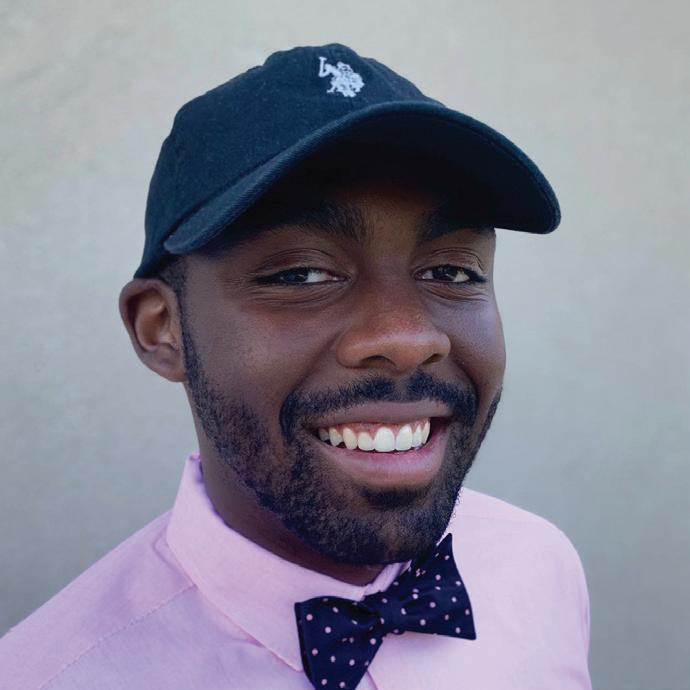
“I am consistently impressed with her work ethic and positive attitude. I am certain she will be an excellent engineer and leader in the future,” said Jennifer Luna-Singh, Ph.D., instructional assistant professor at the University of Houston of Ivbievbiokun, in her nomination for the award. Ivbievbiokun was working on earning a bachelor’s degree in biomedical engineering at the University of Houston when she received the award. In addition to working on several projects, including
leading a group of students testing a new geometry on ballistic materials, Ivbievbiokun was an instructional assistant and mentor during the summer of 2022 at ITECH STEM. While considering going to medical school, Ivbievbiokun realized alternative paths to reach her goal. “Even when I think of what I would be doing in cardiology, I imagined myself doing the behind-thescenes research work,” Ivbievbiokun said. “It was only until starting engineering that I realized I did not need medical school to be a researcher.” She plans to attend graduate school and continue researching after gaining her undergraduate degree.
Phillip Roach stood out in the U.S. Naval Academy (USNA). He held a 3.78 cumulative GPA while being a member of an NCAA Division I varsity men’s basketball team and served in various midshipmen leadership roles at the academy. These accomplishments are what earned him the BEYA StudentAthlete Award for 2023. Roach earned a bachelor’s degree in cyber operations at the academy, played guard on the basketball team, and was named to the 2020, 2021, and 2022 Patriot League Academic Honor Roll. He is an active member of various organizations, including the Midshipmen Black Studies Club. He was 2022–2023 vice president of the National Society of Black Engineers (NSBE) chapter and the Fellowship of Christian Athletes. “He has not only demonstrated astute knowledge in the
classroom, but he has sought outside classroom opportunities to enhance his academic knowledge by interning at the National Security Agency (NSA) in Fort Meade, MD,” stated USNA military professor Yasmin Odunukwe in a letter of recommendation.
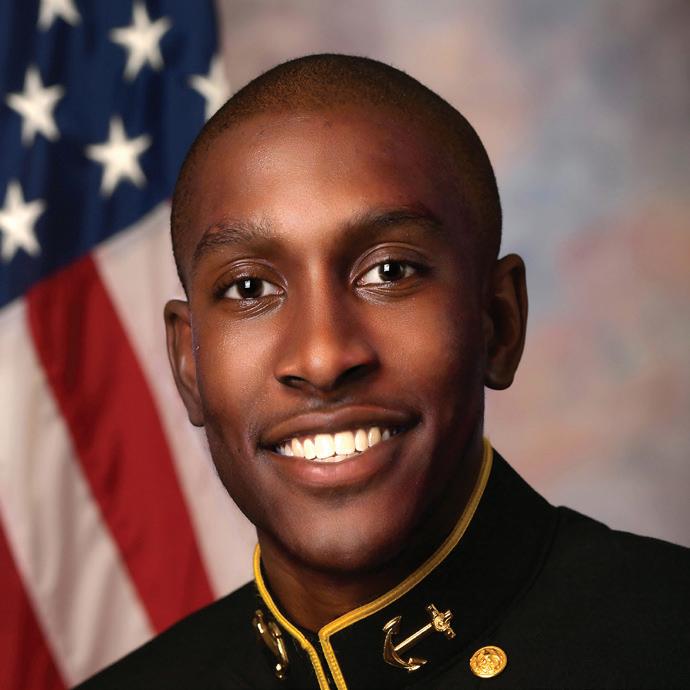

Alabama A&M University
A civil engineering student at Alabama A&M University, Kedrick Scribner was honored with the BEYA Student Leadership Award for 2023. “Kedrick is an exceptional student, academically focused, and is also artistically gifted and talented,” stated Shonda C. Devene, coordinator of voice studies and music director of The Bulldog Beat, of which Scribner is a member. She added that Scribner auditioned for the “highly regarded” performance group accompanying the university president to select destinations. “Kedrick is a performing artist and will be fulfilling multiple roles as a leading singer, actor, and dancer while also serving as an ambassador for the university and College of Engineering,” she said. Scribner is also managing director of The Kedrick Scribner Foundation, for which he’s responsible for identifying program needs, submitting grant bids, managing budgets, and establishing collaborations with other organizations.
Watch these future leaders receive their awards at the 2023 BEYA HBCU Engineering
Deans Recognition Event:
https://www.youtube.com/live/pPFgSht_ gm4?feature=share

Every employee should be empowered to be their authentic self at work. At Boston Scientific, you’ll find:
• Diversity, equity and inclusion programs and initiatives aimed at eliminating bias, racism and other forms of discrimination in our workplace.
• 10 employee resource groups, including BRIDGE, which is dedicated to positively promoting the recruitment, development and retention of Black employees and improving the healthcare of ethnically diverse patient populations.

• Meaningful work that helps save and improve millions of patients’ lives each year.
• Inclusive benefits and an award-winning culture built on shared values.
• Mentorship, sponsorship and other career development opportunities for all employees.
Join our team: bostonscientific.com/careers
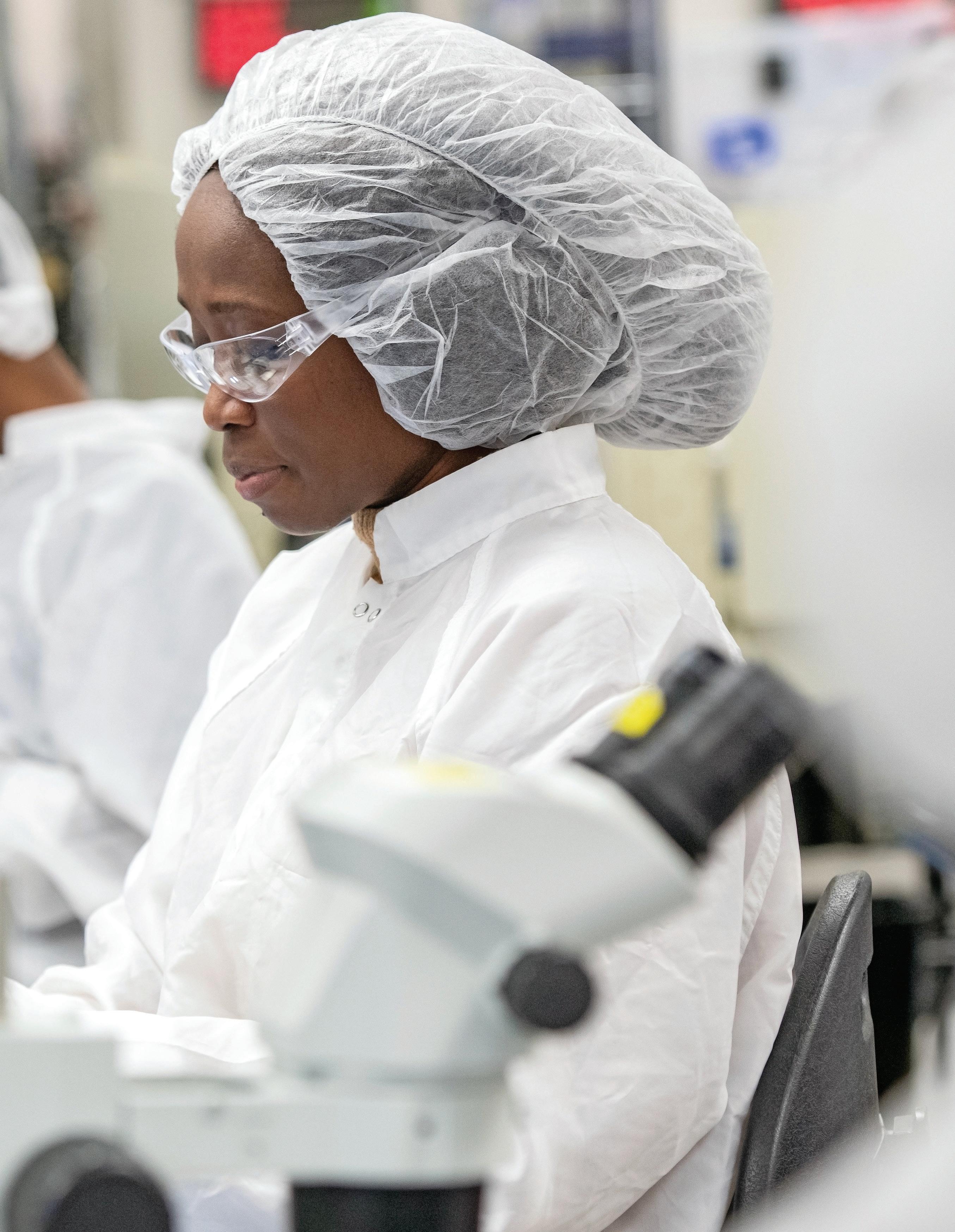


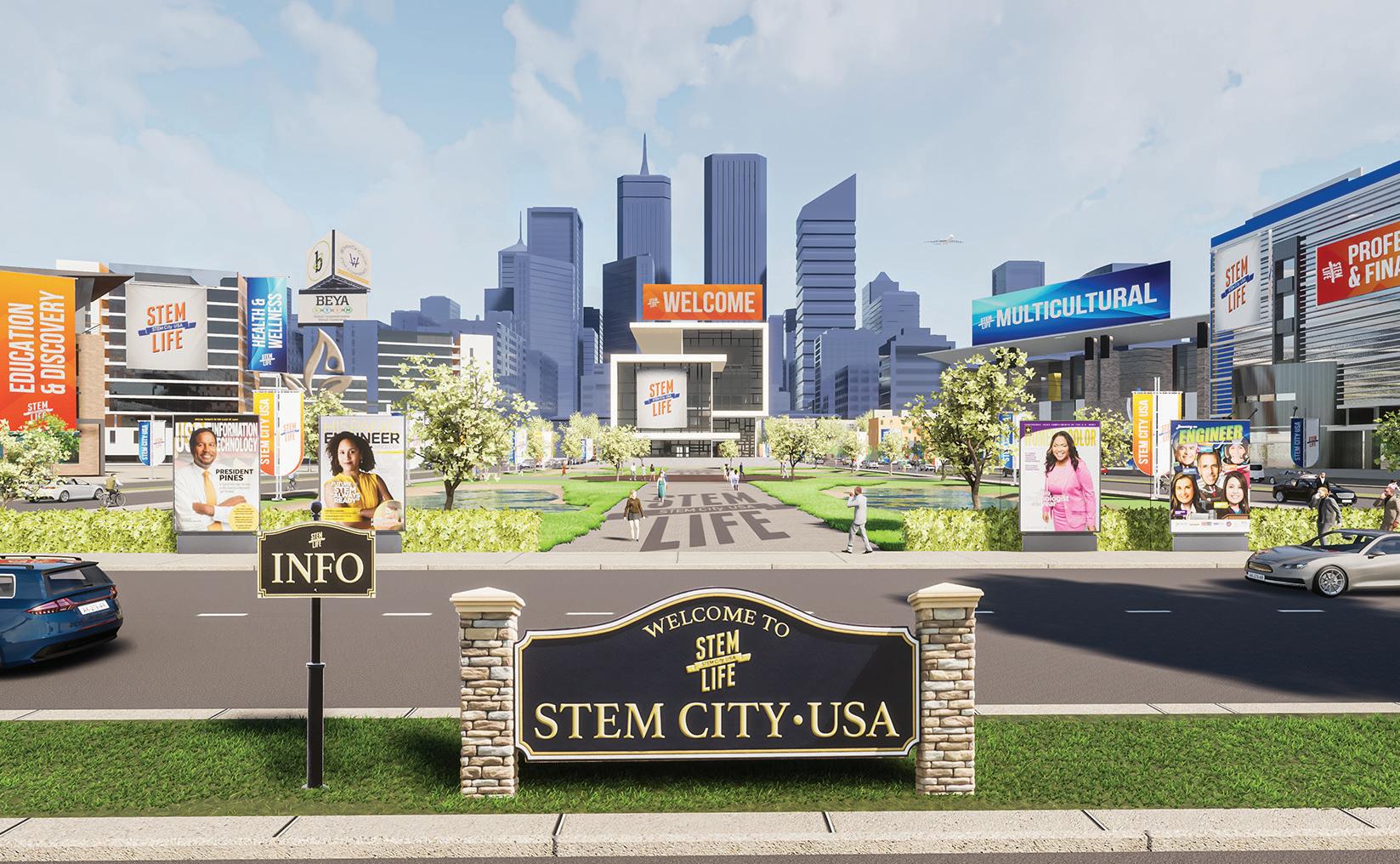


USBE to Celebrate 20th Anniversary of the Top Supporters List at Recognition Event




In the spring of 2003, Career Communications Group (CCG) began a groundbreaking survey with historically Black college and university engineering school deans. Two decades later, USBlackEngineer& InformationTechnology magazine, still in partnership with Advancing Minorities in Engineering (AMIE), released the 2023 list of top supporters of the historically Black college and university engineering schools.
SINCE 2003, HBCU engineering deans and AMIE, a corporate–academic alliance, have completed the CCG Top Supporters of Historically Black College and University Engineering Schools list, a survey conducted by US Black Engineer (USBE) magazine.
While making their decision, HBCU Engineering deans consider support for infrastructure modernization and enhancement, research, participation on advisory councils, faculty development
opportunities, scholarships, student projects, stipends, internship and co-op opportunities, and job offers related to science, technology, engineering, and math (STEM) fields. Top Supporters are companies and government agencies considered most supportive of HBCU engineering programs that contribute to the institutional missions of these schools.
The summer edition of USBE pays tribute to supporters that uphold what the schools symbolize: the power of
community, commitment to education, and the true meaning of diversity. In this historical overview, USBE magazine looks back at some of the issues that deans have discussed for over two decades.
The second annual survey in 2004 found 47 companies were considered most supportive of engineering programs at historically Black colleges and universities (HBCUs) in the opinion of those who oversaw the programs. US Black Engineer magazine’s cover in
2023
the summer of ‘05 was probably the most iconic of the decade. “100 Top Supporters,” the billboard letters read, celebrating the milestone.
On the inside, the editors wrote about how proud the magazine was to recognize the unique contributions of 100 top supporters of engineering schools at HBCUs. USBE editors stressed that the list is essential for two reasons: The schools surveyed graduate onethird of the Black students who receive engineering degrees in the U.S. Second, corporate America’s relationship with HBCUs and non-HBCUs has sometimes been inequitable. Corporate executives tend to support the college they came from. Thus, the total amount of corporate support that Black schools receive does not reflect the level of service they provide in producing engineering talent for the nation.
To mark the 15th year of US Black Engineer magazine’s Top Supporters of Historically Black College and University (HBCU) Engineering survey, employers were ranked based on the number of mentions since 2003. In 2017, there were 394 employers in USBE’s “All-Time Top Supporter” rankings, which featured five tiers: Diamond (14 annual appearances), Platinum (13-9), Gold (8-6), Silver (5-3), and Bronze (2-1).



Twenty years ago, the deans considered outside support vital to their mission. “Corporations and other institutions are
essential to engineering education,” said a former dean of Hampton University. Over the past two decades, engineering deans have reported participating in more effective industry-governmentuniversity teams to address engineering education, research, and development issues. As more corporations merged, one dean noted that corporations usually like their contributions seen as stand-alone support. Overall, engineering colleges are still eager to expand relationships with corporate partners through greater emphasis on research, distinguished professorships, loaned executives, scholarships, fellowships, faculty development, and equipment donation.
Top supporters help departments within engineering colleges meet their accreditation qualification through participation in curriculum development, technology use, and application.


Engineering deans benefit most from scholarships, fellowships, internships, co-op opportunities, research, mentoring, and expanded advisory and partnership roles. No doubt employers derive significant value from relationships with HBCUs. These relationships help organizations stay on the cutting edge of research and industry. They also allow access to proven talent from which to draw. One corporate recruiting manager noted that students, the by-product of partnerships, help spread the word on campus. Many of the top 10 supporters have been sponsors of BEYA, cohosted by the Council of Engineering Deans at Historically Black Colleges and Universities.
Here are the companies and nonprofit organizations considered most supportive of HBCU engineering. These organizations contribute to these schools’ institutional missions and go beyond traditional business-university relationships. S
marks the 20th Anniversary of the Top Supporters List. US Black Engineer magazine reflects on the milestones as part of a yearlong celebration.
In addition, interviews with deans of the ABET-accredited historically Black college and university (HBCU) engineering schools will be posted on BlackEngineer.com throughout the anniversary year.
Lockheed Martin
Microsoft Raytheon Technologies
Abbott Laboratories
The Boeing Company
Boston Scientific
Amazon Northrop Grumman
Motors
Corning Incorporated
Leidos
Alaska Airlines
Ascend Federal Credit Union


Benesch
Capital One
CenterPoint Energy
Chevron
Connoco Phillips
Deloitte
DigiFlight
Dominion Energy
Dow
Enbridge
Entergy
GE Healthcare
General Dynamics Information Technology
HCA
HP, Inc
Jacobs
KBR
Micron Technologies
MITRE
NetApp
Netflix

Nissan Optum
Oracle Corporation
Piedmont Airlines
Procter & Gamble Company
Qurate Retail Group
Republic Airways
SAIC
Siemens
SpaceX State Farm
Swalm Foundation
Texas Instrument
Textron
Turner Construction
Yates Construction, Inc.
ZoomInfo
13.
14.
15.
U.S. Department of Homeland Security (DHS)
U.S.
Southwest Airlines Target
The Southern Company
U.S. Army Materiel Command


U.S. Coast Guard
Under Armour
NOAA
Target













The Historically Black College and University (HBCU) Engineering Directory is the most current at press time. Every year, the listing features key figures at 15 ABET-accredited schools in alphabetical order with names and contact details. The list also has at-a-glance information on academic programs. Bachelor of Science (engineering) programs include civil, electrical, and biomedical engineering. Graduate degrees include master’s and doctoral degrees in computational and data-enabled science and engineering, environmental engineering, and industrial engineering. Research initiatives run from joint effort research in cyber warfare, cyber defense, and hightech computational research and data analysis to the resources that train minority students and establish faculty collaborations in materials research. In addition, some centers strengthen the capacity to research environmental health and health disparities and produce curricula that serve as a foundation for building the next generation of innovative researchers to help solve challenges.
College of Engineering, Technology, and Physical Sciences
Dr. Zhengtao (Z.T.) Deng
Dean, College of Engineering, Technology and Physical Sciences, Professor, Mechanical Engineering Department
The College of Engineering, Technology, and Physical Sciences is organized into four departments, each headed by a department chair: (1) Mechanical and Civil Engineering, (2) Electrical Engineering and Computer Science, (3) Technology, and (4) Physics, Chemistry, and Math. The Computing Accreditation Commission of ABET accredits the B.S. degree in the computer science program.
The B.S. degree in civil engineering, electrical engineering, and mechanical engineering programs are accredited by the Engineering Accreditation Commission of ABET. In collaboration with the College of Education, the College of Engineering, Technology, and Physical Sciences offers a variety of certified and non-certified teaching programs at the undergraduate and graduate levels. The college actively collaborates with government and industry partners in the vibrant Huntsville, AL, research ecosystem.
Bachelor of Science
» Electrical Engineering, Concentration in Nuclear Power
» Mechanical Engineering, Concentration in Nuclear Systems
» Civil Engineering
» Computer Science, Concentration in Cyber Security
» Physics
» Mathematics
» Chemistry
» Construction Management








Graduate Degrees
» Master of Engineering (Systems and Materiel Engineering)
» Master of Science in Computer Science
» Master of Science in Applied Physics
» Ph.D. in Applied Physics
RESEARCH INITIATIVES AND CAPABILITIES
» Materials science and engineering, IC fabrication


» Crystal growth, large and small bandgap, and piezoelectric material
» Image and signal processing, real-time embedded systems




» Cyber security, neural networks, modeling, and simulation in biometrics


» Computational electromagnetics, computational fluid dynamics, finite element analysis
» Advanced manufacturing
» Unmanned aircraft systems, robotics
» Intelligent manufacturing systems and advanced robotics
Dr. Zhengtao (Z.T.) Deng, Dean College of Engineering, Technology and Physical Sciences
Alabama A&M University Arthur J. Bond Hall 4900 Meridian Street Normal, AL 35762
Phone: 256.372.5560 • Fax: 256.372.5580
Email: zhengtao.deng@aamu.edu
Website: http://www.aamu.edu/academics/ engineering-technology/pages/default.aspx
FAMU–FSU College of Engineering
Suvranu De, Sc.D.
Dean, College of EngineeringThe FAMU–FSU College of Engineering is the nation’s only shared engineering college. The institution, based in Tallahassee, FL, has five departments and offers nine areas of study. The college’s faculty runs many prestigious research centers and is closely associated with the National High Magnetic Field Laboratory. Over several years, the institution has enjoyed a rise in rankings, record-breaking research expenditures, and notable academic and research success achievements. More than half of the patents (combined) at FAMU and FSU came out of the joint college. Master’s and doctoral engineering degrees accounted for half of the total advanced degrees produced at FAMU in the 2021–2022 academic year. The 11 doctoral degrees awarded to Black engineers are a record for the top-ranked HBCU.
The college offers comprehensive academic programs at the undergraduate and graduate levels. It works to continually evaluate, expand, and improve programs to ensure that engineering students are prepared for an innovative global society’s demands. The unique partnership allows the college to offer research capabilities and graduate education and attract outstanding faculty. It has first-class programs with world-class research facilities, such as the National High Magnetic Field Laboratory, the High-Performance Materials Institute, the Center for Advanced Power Systems, Resilient Infrastructure and Disaster Response (RIDER) Center, and the Aeropropulsion Mechatronics and Energy Center. We also host multiple NSF HBCU programs, including CREST and multiple RISE, TIP, and EIR programs. Because of its unique model, the college has a student population that reflects the overall U.S. population more than any other ranked engineering school in the country,
thus preparing its students well for working in the real world.
Bachelor of Science
» Biomedical Engineering
» Chemical Engineering
» Civil Engineering




» Electrical Engineering
» Computer Engineering
» Industrial Engineering


» Mechanical Engineering
Graduate Degrees
» Master’s and Doctorate in Chemical Engineering
» Master’s and Doctorate in Biomedical Engineering
» Master’s and Doctorate in Civil Engineering
» Master of Science in Engineering in Civil Engineering


» Master’s and Doctorate in Electrical Engineering
» Master’s and Doctorate in Industrial Engineering
» Master’s and Doctorate in Materials Science and Engineering
» Master’s and Doctorate in Mechanical Engineering
» Master of Science in Industrial Engineering with a major in Engineering Management
» Master of Science in Mechanical Engineering with a major in Sustainable Energy
» Master of Science in Systems Engineering
RESEARCH INITIATIVES AND CAPABILITIES
» Polymers, composites, smart materials, nanomaterials, and nanotechnology and additive manufacturing


» Renewable, advanced, and sustainable energy
» Biomedical imaging and cellular and tissue engineering
» Advanced transportation systems, structures, and hydraulics










» Environmental sustainability and water resources
» Advanced power systems
» Intelligent systems, control, and robotics
» Communication, information technology, and cyber security
» Active and supersonic flow controls
» Superconductivity materials and applications

» Manufacturing and operations research
CONTACT
Suvranu De, Sc.D., Dean and Professor of Mechanical Engineering
FAMU-FSU College of Engineering
2525 Pottsdamer Street, Suite B206 8206, Tallahassee, FL 32310-6046
Phone: 850.410-6161 • Fax: 850.410-6546
Email: dean@eng.famu.fsu.edu
Website: www.eng.famu.fsu.edu
School of Engineering, Architecture, and Aviation
Dr. Joyce Shirazi
Dean, School of Engineering, Architecture, and Aviation


The School of Engineering, Architecture, and Aviation (SEAA) is home to academic programs in Architecture, Aviation, and Engineering. The school enrolls over 300 students and produces about 40 graduates annually. The SEAA strategic plan calls for expanding and strengthening the undergraduate offerings, building graduate engineering programs, and developing clearly defined research areas of excellence. The school is also building contracting relationships with prime contractors in various applications across federal agencies.
Bachelor of Science
» Electrical Engineering
» Computer Engineering
» Chemical Engineering
» Aviation Management
» Air Traffic Control
» Flight Education
Graduate Degrees
» Master of Architecture
RESEARCH INITIATIVES AND CAPABILITIES
» Department of the Air Force UARC Howard University Consortium on Tactical Autonomy
» Cyber security for unmanned autonomous systems; air, sea, land unmanned traffic management, and autonomous infrastructures (AI)
» Polymeric materials for tissue engineering, disease detection, and equipment performance
» Photonics, information fusion, signal processing, machine learning, quantum computing


» Engineering education, K12 STEM emphasis
» Unmanned aircraft systems
» Biotechnology and biomedical engineering
» Chemical process engineering
» Control system engineering












» Material analysis and engineering
» 3D modeling and simulations
» Sea level rise and architectural design


» Urban design
CONTACT
Dr. Joyce T. Shirazi, Dean
School of Engineering, Architecture, and Aviation
Hampton University
268 Marshall Ave • Hampton, VA 23666
Phone: 757.728.6970 • Fax: 757.728.6972
Email: JOYCE.SHIRAZI@HAMPTONU.EDU
Website: http://set.hamptonu.edu
College of Engineering and Architecture
Dr. John M. M. Anderson
Dean, College of Engineering and Architecture
The College of Engineering and Architecture (CEA) comprises five departments: architecture, chemical engineering, civil and environmental engineering, electrical and computer science, and mechanical engineering. CEA offers fully accredited Bachelor of Science, Bachelor of Architecture, and Master of Architecture programs. Graduate degree programs with abounding research opportunities offered in the engineering disciplines are Master of Science, Master of Engineering, and Doctor of Philosophy. The college also offers
certificates in cyber security and other professional programs.
CEA graduates are skilled in applying technological and scientific solutions to complex and challenging societal problems, critical thinking, creative design, leadership, teamwork, and effective communication skills. CEA has five academic departments that house seven programs offering accredited undergraduate, graduate, and professional programs. The departments are Architecture, Chemical Engineering, Civil and Environmental Engineering, Electrical Engineering and Computer Science, and Mechanical Engineering.
Bachelor of Science
» Architecture and Design Studies






» Chemical Engineering
» Civil Engineering
» Electrical Engineering
» Computer Engineering
» Mechanical Engineering
» Computer Science
Graduate Programs
» Master of Architecture
» Master of Science in Engineering (in Civil, Computer, Electrical, and Mechanical Engineering)
» Master of Science in Chemical Engineering
» Master of Computer Science
» Ph.D. (in Computer and Information Systems Engineering, Civil Engineering, Electrical Engineering, and Mechanical Engineering)
» Cybersecurity Graduate Certificate





» Chemical Engineering: Biomolecular, nanotechnology, and environmental engineering
» Civil and Environmental Engineering: Structural engineering, transportation engineering, geotechnical engineering, environmental engineering, water resources–sustainable engineering, nanotechnology
» Electrical and Computer Engineering: Signal processing, communications–power, control–electromagnetics, antenna–material sciences, and nanotechnology–digital systems


» Mechanical Engineering: Materials engineering, computational fluid mechanics, manufacturing engineering/ additive manufacturing
» Computer Science: Cyber security, computational biology, machine learning, data communications, computer science education
John M. M. Anderson, Dean
College of Engineering and Architecture
2366 6th Street, NW • Suite 100 Mackey Building
Howard University • Washington, DC 20059
Phone: 202.806.6565 • Fax: 202.299.9163
Email: CEADean@howard.edu
Website: https://cea.howard.edu/
College of Science, Engineering and Technology
Dr. Wilbur Waters
Dean, College of Science, Engineering, and Technology
The College of Science, Engineering, and Technology at Jackson State University is committed to implementing its mission and focusing its intellectual, experience, and other resources on improving the quality of life for its students, the surrounding community, state, nation, and the global community. It is comprised of nine academic departments. Among them are the Civil and Environmental Engineering departments and Electrical and Computer Engineering, which provide students with quality ABETaccredited undergraduate and graduate programs that incorporate the systems aspect of professional engineering practice. The college has achieved a 7 percent increase in enrollment since 2010 and has been awarded 130 federally funded grants and contracts with awards of approximately $20 million annually. It also has over 14 federally funded student support programs.
ACADEMIC PROGRAMS
Bachelor of Science (Engineering)
» Civil Engineering
» Environmental Track
» General Civil Engineering
» Computer Engineering
» Computer Science
» Electrical Engineering
» Biomedical Engineering
» General Electrical Engineering
» Power Systems Track
» Industrial Engineering
Graduate Degrees (Engineering)
» Master of Science in Computational and Data-Enabled Science and Engineering
» Master of Science in Computer Science
» Master of Science in Engineering:
» Master of Science in Civil Engineering
» Master of Science in Computer Engineering
» Master of Science in Computational Engineering
» Master of Science in Electrical Engineering
» Master of Science in Environmental Engineering
» Master of Science in Geological Engineering
» Master of Science in Industrial Engineering
» Ph.D. Engineering
» Ph.D. Computational and Data-Enabled Science and Engineering
RESEARCH CENTERS
» Coastal Hazards Center of Excellence
» Center for Defense Integrated Data
» High-Performance Computing Center
» Interdisciplinary Center for Nanotoxicity
» Center for Bioinformatics & Computational Biology Research
» Centers in Minority Institutions
» Center for Environmental Health
CONTACT
Dr. Wilbur Walters, Dean
College of Science, Engineering & Technology
Jackson State University
1400 JR Lynch Street - JSU Box 18750
Jackson, MS 39217
Phone: 601-979-2153/601-979-4044
Email: wilbur.l.walters@jsums.edu
Website: www.jsums.edu/science
Clarence M. Mitchell, Jr. School of Engineering
Oscar Barton, Jr., Ph.D., PE
Dean, Clarence M. Mitchell, Jr. School of Engineering
Morgan State University is designated as Maryland’s preeminent public urban research university and is responsible for addressing the needs of residents, schools, and organizations in the Baltimore metropolitan area. To meet the academic desires of its diverse student body, Morgan is guided by its motto, “Growing the Future, Leading the World.” Morgan has nine schools and one college that offer 140 degree programs through the terminal doctoral degree. Several Centers of Research Excellence support these units in achieving their goal of becoming an R1 by 2030. The Clarence M. Mitchell, Jr. School of Engineering (MSOE) has four departments supporting four accredited
programs, including electrical, industrial, and transport systems. Nanomechatronics engineering, its most recent bachelor’s degree program, will seek initial accreditation in 2024. MSOE ranks first in Maryland for bachelor’s degrees awarded in civil, electrical, and industrial engineering, third in Maryland for master’s degrees awarded in electrical, and first in the state for doctoral degrees awarded in engineering to African Americans. MSOE enrolls about 850 students at the undergraduate and graduate levels who are inspired to dream by an outstanding faculty engaged in research to improve society. Smart cities, intelligent adaptive structures, artificial intelligence (AI), data analytics, cyber security, advanced materials, communications, and transportation are a few research areas of interest.
ACADEMIC PROGRAMS
Bachelor of Science
» Civil Engineering
» Electrical Engineering
» Industrial Engineering
» Mechatronics Engineering
» Transportation Systems (Applied Science)
» Transportation Systems Engineerin Certificate Programs
» Post-Baccalaureate Certificate (PBC) in Urban Transportation
» Cybersecurity
Graduate Degrees
» Master of Engineering
» Master of Science in Electrical Engineering
» Master of Science in Urban Transportation
» Ph.D. in Engineering
» Ph.D. in Secure Embedded Systems
» Ph.D. in Transportation & Urban Infrastructure Systems
RESEARCH INITIATIVES AND CAPABILITIES
Electrical and Computer Engineering




» Cybersecurity operations and physical systems
» Software-defined and cognitive radio systems
» RF/microwave/MM wave communication systems

» Computational engineering and analytics
» High-performance analog integrated circuits












» Biomedical engineering systems
» Wireless cyber security/information assurance
» Engineering education
» Image and signal processing
» Civil and environmental engineering
» Water resources and ground water systems
» Bridge/large-scale structural systems


» Geotechnical studies
» Geospatial and remote sensing studies


» Fluid mechanics
» Industrial and systems engineering, lean and advanced manufacturing


» Robotics and automated manufacturing
» Project and engineering management
» Ergonomics/human factors engineering
» Energy systems
» Data mining
» Industrial safety and health
» Operations research
» Transportation and urban infrastructure systems
» Safety and behavioral analysis
» Transportation inequity and challenges in underserved urban communities
» Intelligent transportation systems— autonomous and connected vehicle operational issues
» Smart infrastructure asset management
» Public and freight transportation network performance analysis and optimization
» Demand responsive transportation
» Multimodal transportation planning— complete street initiatives
Oscar Barton, Jr., Ph.D., PE, Dean Clarence M. Mitchell, Jr. School of Engineering
Morgan State University
Phone: 443-885-3231
Fax: 443-885-8218
Email: oscar.barton@morgan.edu
Website: www.soe.morgan.edu
College of Science, Engineering & Technology
Dr. Michael Keeve
Dean, College of Science, Engineering, and Technology
The College of Science, Engineering, and Technology (CSET) has over 1,800 students and over 30 percent of the university’s student enrollment. Undergraduate programs are ABET-accredited, and graduate programs are driven by innovative state-of-theart research programs that enhance the educational experience for students and prepare them for national defense, industrial, and academic careers. The College of Science, Engineering, and Technology has been pivotal in the university’s 85-year history. Faculty contributions in research, education, service, and mentoring are exceptional. Graduates are securing outstanding jobs and earning


advanced degrees. The college currently houses several research centers—the Center for Materials Research (CMR), the Information Assurance—Research, Education, and Development Institute, the Micro- and NanoTechnology Center, the Creative Gaming and Simulation Laboratory, and the Cyber Security Complex.
Bachelor of Science
» Electrical and Electronics Engineering
» Optical Engineering
» Computer Science–Information
Assurance and Computer Engineering
» Electrical and Electronics Engineering






Graduate Degrees
» Master of Science in Electrical and Electronics Engineering
» Master of Science in Materials Science
» Master of Science in Computer Science
» Master of Science in Cyber Security
» Ph.D. in Materials Science and Engineering
RESEARCH INITIATIVES AND CAPABILITIES
» Cyber security
» Information assurance
» Cognitive wireless networks
» Cloud computing security
» Digital forensics
» Smart grids security



» Modeling of biological neurons
» Optics
» Plasmonic and meta-materials
» Nano-materials and nano-technology
» Advanced functional materials and devices
» Semiconductor materials and devices
» Neural probes


» Biosensors
» Photovoltaics
» MEMS actuators
» Multifunctional sensors
» High-k dielectrics
CONTACT
Dr. Michael Keeve, Dean College of Science, Engineering, and Technology, Professor of Mathematics, Norfolk State University
700 Park Avenue, Norfolk, VA 23504
Phone: 757.823.8180 Fax: 757.823.9114
Email: mokeeve@nsu.edu
Website: [www.nsu.edu/cset]www.nsu.edu/ cset
The College of Engineering at North Carolina A&T State University is committed to engineering the future and revolutionizing the world. It is proud of its education and research quality and inspired by the innovativeness, capabilities, and achievements of its engineering and computer science students, graduates, faculty, and staff. Its 10 bachelor’s, eight master’s, and five doctoral degree programs are distributed across seven departments— all 10 of N.C. A&T’s College of Engineering’s undergraduate programs are ABET-accredited. The college’s prioritization of innovative research, the global competitiveness of its students and graduates, and an innovation ecosystem enable the college to serve as a solid technical epicenter for regional, national, and international partners and as the No. 1 producer of African-American engineering graduates for the nation.
Departments
» Civil, Architectural, and Environmental Engineering
» Chemical, Biological, and Bioengineering
» Computational Data Science and Engineering
» Computer Science
» Electrical and Computer Engineering
» Industrial and Systems Engineering
» Mechanical Engineering
Degrees Offered
» Architectural Engineering (B.S.)












» Bioengineering (B.S., M.S.)
» Biological Engineering (B.S.)
» Chemical Engineering (B.S., M.S.)
» Civil Engineering (B.S., M.S.)
» Computer Engineering (B.S.)
» Data Science and Engineering (M.S.)
» Computational Data Science and Engineering (Ph.D.)


» Computer Science (B.S., M.S., and Ph.D.)
» Electrical Engineering (B.S., M.S., and Ph.D.)
» Industrial and Systems Engineering (B.S., M.S., and Ph.D.)
» Mechanical Engineering (B.S., M.S., and Ph.D.)
(Beginning in Fall 2022, online M.S. degrees
are also offered in Civil, Electrical, Industrial & Systems Engineering; Computer Science; and Data Science & Engineering.)
Five COE Cross-Departmental Research Clusters
» Autonomous Systems
» Cybersecurity and Resilience
» Energy and Sustainability
» Healthcare Applications
» Complex Systems and Networks
Stephanie Luster-Teasley, Ph.D.
Interim Dean, College of Engineering


Professor, Department of Civil, Architectural, and Environmental Engineering
North Carolina A&T State University
Greensboro, NC 27411
Phone: 336-285-2640 • Fax: 336-334-7540
Email: luster@ncat.edu
Website: www.ncat.edu/coe
Twitter: @COENCAT
Roy G. Perry College of Engineering
Dr. Pamela Holland Obiomon
Dean and Professor, Roy G. Perry College of Engineering
The Roy G. Perry College of Engineering offers six ABET-accredited undergraduate programs, four master’s degrees, and one Ph.D. degree. The college is a unique community of students, faculty, staff, and scholars dedicated to advancing, sharing, and communicating engineering and computer science knowledge. Housed in a six-building engineering complex on the Prairie View A&M main campus, the most highly focused component of the college is student learning. Undergraduate and graduate programs are structured for discovery, applied learning, interpretation, and the communication of learning through shared interactive courses and laboratories designed to engage students and faculty alike. The college prepares students to become dedicated and productive members of society. The college receives about $14 million in funded projects annually from governmental agencies and private sectors. The college enrolls more than 1,600 students; about 15 percent are graduate student.
ACADEMIC PROGRAMS
Bachelor of Science
» Chemical Engineering
» Civil Engineering
» Computer Engineering
» Computer Science
» Electrical Engineering
» Mechanical Engineering
Graduate Degrees
» Master of Science in Engineering with concentrations in Chemical, Civil, Environmental, and Mechanical Engineering
» Master of Science in Computer Science
» Master of Science in Computer Information Systems
» Master of Science in Electrical Engineering
» Ph.D. in Electrical Engineering
» Center of Excellence in Research and Education for Big Military Data Intelligence (CREDIT)
» Center of Excellence for Cybersecurity (SECURE)
» Smart Microgrid Advanced Research and Technology Center (SMART)
» Center for Computational Systems Biology
» Center for Energy and Environmental Sustainability (CEES)
» Center for High-Pressure Combustion in Microgravity
» Center for Radiation Engineering and Science for Space Exploration


» Center of Excellence for Communication Systems Technology Research
» Thermal Science Research Center
» Future Aerospace Science and Technology
» Texas Gulf Coast Environmental Data Center
CONTACT
Dr. Pamela Holland Obiomon, Dean and Professor
Roy G. Perry College of Engineering
Prairie View A&M University
P.O. Box 519, MS 2500 Prairie View, TX 77446
College of Sciences and Engineering
Dr. Patrick Carriere
Dean, College of Sciences and Engineering
The College of Sciences and Engineering provides students with technological skills and opportunities that stimulate professional, educational, and personal growth. The college provides this growth through a diverse faculty and staff committed to teaching, research, and service. Students
are encouraged to participate in laboratory research and cooperative education programs that enhance career confidence. They are also encouraged to participate in ongoing research with faculty members contributing to engineering innovations. The college maintains an atmosphere that enhances students’ ability to achieve the optimum learning experience. The environment is collegial and focused on student and workforce needs. The college’s program offerings include nine bachelor’s degree programs: biology, chemistry, computer science, physics, electronic engineering technology, civil engineering, electrical engineering, mechanical engineering, and mathematics. It offers five master’s degree programs: engineering, computer science, biology, mathematics, and physics. It also offers doctoral programs in environmental toxicology and science and math education. The civil, electrical, and mechanical engineering programs are accredited by the Engineering Accreditation Commission (EAC) of ABET. The computer science program is accredited by the Computing Accreditation Commission (CAC) of ABET. The electronics engineering technology program is accredited by the Engineering Technology Accreditation Commission (ETAC) of ABET.
ACADEMIC PROGRAMS
Undergraduate Programs
» Biology
» Chemistry
» Computer Science
» Mathematics
» Physics
» Electronics Engineering Technology
» Civil Engineering
» Electrical Engineering
» Mechanical Engineering
Graduate Programs
» Master of Engineering
» Master of Science in Computer Science
» Master of Science in Biology
» Master of Science in Math/Physics
» Ph.D. in Environmental Toxicology
» Ph.D. Science/Math Education
» Industrial wastewater treatment, air pollution, solid wastes
» Pavement design and management; nanomechanics of clay materials
» Telecommunications and computer network engineering
» Electronic materials and processing; semiconductor device fabrication

» Advanced materials; micro and nano technologies
» Renewable energy and energy optimization; computational fluid and heat transfer
» Operating systems and architecture; algorithms and theory of computing








» Software engineering; digital data communications
» Database management and data mining
Dr. Patrick Carriere, Dean
College of Sciences and Engineering
Suite# 206, P.B.S. Pinchback Engineering Building
Southern University and A&M College, Baton Rouge, LA 70813-9969
Email: patrick_carriere@subr.edu • Phone: 225-771-5290 • Fax 225-771-5721
Website: http://www.subr.edu/cse
College of Engineering
Lin Li, Ph.D., P.E.
Fellow of ASCE, Professor of Civil Engineering & Interim Dean
The College of Engineering is committed to providing the highest-quality industrydriven curricula in engineering, technology, computer, and mathematical sciences. The college currently provides accredited B.S. and graduate degrees in strategic and emerging disciplines for research and working professionals. Advanced laboratories and research centers support graduate programs in cyber-physical and security systems, advanced materials, sensor and data fusion, control systems, bioinformatics, energy systems, and wireless communication. The college has funded grants with the Air Force Research Lab, Army Research Office, U.S. Navy, Department of Homeland Security, Department of Transportation, Boeing Company, and the NSF. The college enrolls about 900 students and produces about 75 graduates annually.
ACADEMIC PROGRAMS
Bachelor of Science
» Architectural Engineering










» Civil and Environmental Engineering
» Electrical and Computer Engineering


» Mechanical and Manufacturing Engineering
» Applied and Industrial Technologies
» Computer Science






Graduate Degrees
» Master of Engineering
» Master of Science in Computer and Information Systems Engineering
» Master of Science in Computer Science
» Ph.D. in Engineering and Computational Science
RESEARCH INITIATIVES AND CAPABILITIES
» Cybersecurity/physical systems
» Advanced materials
» Sensor and data fusion
» Intelligent health monitoring and control systems
» Data and network security
» Wireless communication
» Advanced transportation systems and infrastructure
» Intelligent manufacturing systems and advanced robotics


Lin Li, Ph.D., P.E., Fellow of ASCE
Professor of Civil Engineering & Interim
Dean
College of Engineering
Tennessee State University
3500 John A Merritt Boulevard
Nashville, TN 37209
Email: lli1@tnstate.edu
Phone: (615) 963-5401
https://www.tnstate.edu/engineering/dean. aspx
College of Engineering
Heshmat Aglan, Ph.D., P.E.
Dean and Professor, College of Engineering
The College of Engineering is regarded as premier for producing exceptionally prepared graduates ready to perform with a broad educational background. The college provides an academic portfolio through engineering disciplines to engage students in envisioning learning excellence, research and exploration, and service to the nation and the global community. The college is programmed for excellence with the context of Booker T. Washington, George Washington Carver’s innovation, and the Tuskegee Airmen’s mettle, armed with facilities, professional faculty and staff, and resources that support public/private funding as demonstrated by its partners and friends. Graduate programs explore new frontiers for solutions that support global issues.
Accredited undergraduate programs have become a tradition for students to enter and complete post-secondary/graduate studies in engineering.
Bachelor of Science
» Aerospace Science Engineering
» Chemical Engineering
» Computer Engineering
» Electrical Engineering


» Mechanical Engineering
Graduate Degrees
» Master of Chemical Engineering
» Master of Electrical Engineering
» Master of Mechanical Engineering
» Master of Materials Science and Engineering
» Ph.D. in Materials Science and Engineering
» Aerospace: aerodynamics, flight simulation, human interface, aeronautics, and low Earth orbit satellites.
» Chemical: bio-fluidics/fuels/chemical, corrosion, environmental, water and wastewater, modeling.


» Electrical: electronic warfare, systems engineering, smart grid, adaptive networks, cybersecurity.

» Mechanical: fatigue and fracture, corrosion, coatings, robotics, metallurgy, additive manufacturing, supersonic fluid mixing, and indoor air quality/flood abatement.
» Materials Science: characterization, nanomaterials, performance/nondestructive evaluation.










Dr. Heshmat A. Aglan, P.E. Dean and Professor Tuskegee University College of Engineering
200 Luther Foster Hall, Tuskegee, AL 36088
P 334-727-8081
Email: haglan@tuskegee.edu
Website: www.tuskegee.edu
School of Engineering and Applied Sciences
Dr. Devdas Shetty
Dean, School of Engineering & Applied Sciences
The School of Engineering and Applied Sciences (SEAS) offers nationally competitive and fully accredited professional programs
at the baccalaureate and graduate levels, including a new doctoral program. These programs enable immediate employment upon graduation or for the continuation of advanced-level studies. The school offers strong, ABET-accredited bachelor’s degree programs in civil, electrical, mechanical engineering, and computer science. SEAS also offers a bachelor’s degree program in information technology. It offers master’s degree programs in computer science and civil, electrical, and mechanical engineering, along with Ph.D. programs in computer science and engineering.
ACADEMIC PROGRAMS
Undergraduate Degree Programs
» B.S. in Biomedical Engineering
» B.S. in Civil Engineering




» B.S. in Electrical Engineering
» Computer Engineering Option
» B.S. in Mechanical Engineering
» B.S. in Computer Science
» B.S. in Information Technology
Graduate Degree Programs
» Master of Science in Civil Engineering


» Master of Science in Computer Science
» Master of Science in Electrical Engineering
» Master of Science in Mechanical Engineering
» Ph.D. in Computer Science and Engineering
RESEARCH CAPABILITIES
Research capabilities include cyber security, cloud computing information assurance, high-performance computing, wireless and sensor networks, computational intelligence, computational geometry, robotics and autonomous systems, mechatronics, energy conversion, modeling and simulation, advanced manufacturing, product design, nanotechnology, thermal science, optical engineering, renewable energy, rehabilitation engineering and bio-assisted devices, structural engineering, intelligent transportation systems, water resources engineering, and construction engineering. The school has the Center for Biomedical and Biomedical and Rehabilitation Engineering, which focuses on studying human mobility, and The SEAS Research Center.
Dr. Devdas Shetty, P.E., Dean
School of Engineering and Applied Sciences
University of the District of Columbia 4200 Connecticut Ave. NW, Washington, DC 20008
Phone: 202.274-5220 • Fax: 202.274-5520
Email: Devdas.shetty@udc.edu
Website: www.udc.edu/seas
Department of Engineering and Aviation Services
Dr. Derrek B. Dunn
Dean, School of Business and Technology
The School of Business and Technology includes six academic departments: Business, Management, and Accounting; Engineering and Aviation Sciences; Hospitality and Tourism Management; the PGA Golf Management program; Mathematics and Computer Science; and Technology. The faculty members within the school are actively engaged in funded research and educational projects, many of which involve undergraduate and graduate students.
Bachelor of Science
» Engineering
» Aviation Sciences
» Accounting
» Business Administration
» Finance
» Marketing
» Business Education
» Hospitality and Tourism Management
» PGA Golf Management
» Mathematics
» Mathematics Education
» Computer Science
» Construction Management Technology
















» Engineering Technology
» Technology Education
Graduate Degrees
» Master of Science in Applied Computer Science
» Master of Education in Career and Technology Education
» Master of Science in Cyber Security Engineering Technology

Aerial imaging and remote sensing for precision agriculture; biofuels, sustainability, and geospatial information technologies; renewable energy; sparsity aware adaptive radar sensor imaging; structural health monitoring; air-propelled instrumented robotic sensory platform design and development; signal processing for detection and monitoring of electrical power signals; on-chip optical interconnected computer architecture, UAV design, and testing.
Dr. Derrek B. Dunn, Dean School of Business and Technology, University of Maryland Eastern Shore 30925 College Backbone Road, Princess Anne, MD 21853
Phone: 410-651-6067 Fax: 410-621-2375
Email: ddunn@umes.edu Website: www. umes.edu/sbt/
College of Engineering and Technology
Dr. Dawit Haile
Dean, College of Engineering and Technology
The College of Engineering and Technology is focused on solving tough problems. The college defines success as the growth and discovery of fundamental knowledge and the movement of these ideas and results from the laboratory to the real world. The goal is to transform communities by attracting and retaining key industries, enhancing economic development, and creating jobs. Its research helps companies improve their products and services for items as diverse as jet engines, copiers, and cutting tools. The college aligns resources and capabilities to the workforce needs of local, regional, and national economies.
ACADEMIC PROGRAMS
Bachelor of Science
» Computer Engineering
» Manufacturing Engineering
» Computer Science
» Information Logistics Technology
» Mechanical Engineering Technology
» Electronics Engineering Technology




» Mathematics
» Economics
Graduate Degrees
» Master of Science in Computer Science
» Master of Science in Mathematics


» Master of Art in Economics
RESEARCH INITIATIVES AND CAPABILITIES
» Data analytics, multimedia data mining, machine learning
» Cyber security
» Additive manufacturing/machining, cyber-physical manufacturing, nanomanufacturing process, and technology
» Robotics and autonomous system
» Human-computer interaction
» Enterprise systems and logistics, ERP
integration analytics, and business intelligence
» Commonwealth Center for Advanced Manufacturing (http://www.ccam-va.com)
» Commonwealth Center for Advanced Logistics Systems (http://www.ccals.com)
Dr. Dawit Haile, Dean and Professor College of Engineering and Technology, Virginia State University
Petersburg, VA 23806
Phone: 804-524-5461/804-524-1205
Fax: 804-524 5746 F
Email: DHaile@vsu.edu
Website: www.cet.vsu.edu S

Keep
l.ead.me/bbUBoU
up to date with the latest news on HBCUs and their engineering programs

Leidos is committed to fostering a highly diverse, deeply inclusive workforce where every employee can leverage their unique talents to help drive innovative solutions. We’re seeking powerhouse talent in the areas of IT, engineering and science.

careers.leidos.com/USBE

During the 2023 HBCU Engineering Deans Recognition event at the BEYA Conference, Dr. Joyce T. Shirazi, dean of the Hampton University School of Engineering, Architecture, and Aviation, presented details about a National Science Foundation-funded project.
USBE sat down for an interview with Shirazi to discuss the research objectives and the impact of the project on the American public, as well as other topics related to her distinguished career and the School of Engineering, Architecture, and Aviation at Hampton University. Here are some highlights from our conversation.
USBE: What is the research team exploring and what is the anticipated impact for the American public?
SHIRAZI: The interdisciplinary research team will explore joint design of static sensor networks and mobile aquatic robots to provide proactive biochemical sensing of dynamic water conditions at large scales in space and time. It serves the long-term goal of building research capacity. Specific research objectives, led by Dr. Joy Zhao Sun, associate professor, include (1) biogeochemical sensor-robot network design, intelligent sampling, and data analysis; (2) machine learning
methods and data-driven models for marine species density and growth estimation; (3) optimal navigation, path planning, and robust control of aquatic robots for effective mobile sensing; and
(4) field deployment and performance evaluations. This project will develop and demonstrate a new and highly effective approach for large-scale proactive environmental sensing, providing critical data and models for informed decision making in pollution control, water system management, and marine ecosystem restoration in the Hampton River and Chesapeake Bay.
The research will provide valuable water quality, oyster growth and ecosystem restoration data, and information for peer researchers and the general public. It will help increase the number of underrepresented students in STEM and provide unique and exciting opportunities for mentoring graduate and undergraduate students.
USBE: Some of the research objectives announced include intelligence sampling, data analysis, machine learning methods, data-driven models for

marine species growth estimation, optical navigation, aquatic robotics. Tell us about some of the outstanding contributions of the undergraduate student researchers to meeting these objectives.
SHIRAZI: Hampton University undergraduate student researchers are making outstanding contributions in machine learning-based navigation and control of autonomous vehicles and are presenting with two conference research papers this year. Three additional students contributed to a paper, “Development of a ResearchBased Course on Machine Learning and Robotics for Undergraduate Engineering Students at Hampton University” for an ASEE Conference. Furthermore, in collaboration with graduate students from the University of Missouri, Hampton University undergraduate students will work on data-driven modeling for marine species density and growth estimation this summer.
USBE: How are students recruited for integrated research at Hampton University?
SHIRAZI: One of the best examples involves our successful 2023 installation of a Raytheon Skyler Radar, ADS-B/GPS Antenna, and weather sensors at the Hampton University Harbour Centre.
Led by Chair and Assistant Professor John Murray, we created a nationally recognized, and the first-ever university autonomous infrastructure Lab powered by our industry partner, the Longbow Group.
We have eight student researchers working on projects funded by the Virginia Space Grant Consortium, NASA Langley Research Center, FAA, and NOAA. It is one of the newest Hampton University research facilities and it is part of our plan for the development of our corridor and the Unmanned Systems Research and Technology Center at Fort Monroe, connecting education with research.
Our students receive research experience with hands-on industry applications via the Skyler Radar, data fusion, machine learning, drone operations, and development of an autonomous infrastructure for the City of Hampton. They help establish baseline parameters using the additional ADS-B/ GPS system registered on the operation room displays, which provides civilian aircraft frequency information to avoid conflicts and for safety protocols with our UAS operations. Students engage in Space Act spotter/observer training at the Fort Monroe High-Density Vertiport test site for certified, official membership in the NASA UAS team and are eligible to receive funding. We established
Dr. Shirazi explains the importance of the Hampton-Brandeis Partnership for Research in Education and Materials (PREM) program, which allows the expansion between Hampton Universitybased materials science researchers and colleagues at the Brandeis University Materials Research Science and Engineering Center (MRSEC).
Skyler Radar data links with NASA to enable sharing of information with flight checks of the Skyler Radar and NASA Langley radars. Students successfully operate the Skyler Radar, monitoring, tracking, and recording aircraft in three-radar tests for data fusion of common air pictures over the City of Hampton and the lower Chesapeake Bay. Another example is the HamptonBrandeis PREM integrated research program, which intentionally focuses on the freshman to sophomore year transition, for improving Hampton’s STEM retention rate in gatekeeper courses (calculus, chemistry, and physics) and provides financial assistance. Led by Dr. Demetris Geddis, assistant dean and associate professor, during the fall semester, freshmen chemistry, engineering, and physics students are recruited and asked to apply for the PREM Scholars program and the Brandeis REU program. At the end of the fall semester, a joint review process between Hampton and Brandeis is conducted. Six students are selected as HBP scholars. These new recruits are awarded scholarship for their sophomore year and are required to minor in Material Science and Engineering, participate in the REU at Brandeis during the summer, continue REU related research at Hampton as sophomores and serve as peer tutors. Students are encouraged to continue the research program as juniors and seniors.
USBE: Recently, Hampton University partnered with Amazon on robotics research. What are some of the activities?
SHIRAZI: As dean of the Hampton University School of Engineering,

When asked how her experiences in Chevron, Mobil, and McDonnell Douglas have influenced her leadership vision at Hampton University, Dr. Shirazi stated that her corporate experiences taught her the importance of teamwork, collaboration, clear communication, and adaptability.
Architecture, and Aviation, our partnership with Amazon and their K-12 STEM Robotics/Drone Summer Camp is instrumental in establishing the development of our first summer camp. Students had learning experiences at both Brown University and Amazon MassRobotics last summer which enabled our team of Hampton University students to collaborate on various drone platforms and assist in the aerodynamics and programming beta testing of small, unmanned aircraft systems. Our first on-campus Hampton University Drone/Robotics program is planned for this summer with high school students from the City of Hampton Public School system.
The Amazon Robotics Research program is very effective because academia, industry, and governmental agencies are collaborating to bring this new transportation system into reality. The Amazon Robotics research grant experience has enabled the development of a new, innovative academic curriculum for Aviation Management Uncrewed Aircraft Systems.
The investment in cloud-based research, infrastructure improvements, and STEM-based activities has been critical to the digital transformation of Hampton University because it has initiated the removal of structural constrictions and has enabled both faculty and students to engage in cutting-edge research and instruction. Senior electrical and computer engineering students are able to complete yearlong capstone projects with state-of-the-art Kinova Robotics arms and AI/ML-based autonomous vehicles. They actively conduct research projects and participate in summer internships at Amazon. Both faculty and students have been able to develop STEM activities for K-12 outreach.
USBE: The School of Engineering and Technology recently celebrated the 25th anniversary. Are there other milestones or plans for the future?
SHIRAZI: Yes, as part of the 2022–2033 Strategic Plan, “Elevating Hampton Excellence,” the School of Engineering and Technology was recently renamed the School of Engineering, Architecture and Aviation. Under the dynamic leadership of President Darrell K.
Williams, the new and 13th president of Hampton University, it is one of four enhanced units within the first goal in the strategic plan. This goal is to elevate academic excellence, and includes a promise to deliver the No. 1 student experience in America. We are the second largest producer of licensed African-American architects in the nation. Our Architecture program has over 55 years of continuous accreditation. We are one of seven HBCUs with architecture programs. Our Aviation program has over 25 years of continuous accreditation. We are the only HBCU with all aviation programs accredited. All degree programs are nationally accredited by ABET, AABI, and NAAB. We are combining and highlighting the talents of all three areas, in the new name, School of Engineering, Architecture and Aviation (SEAA). With our advancement into autonomous infrastructure (AI), rebranded as the School of Engineering, Architecture, and Aviation, we are expanding to become a Center of Excellence for AI Research and Urban Planning for the Hampton Roads community, the state of Virginia, and the nation—working with city and state planners to develop autonomous systems and infrastructure for the new smart city transportation network.
USBE: Hampton University engineering students won the AMIE Design Challenge for threeconsecutive years. What does that say about the importance of real-life skill development in STEM education?

SHIRAZI: Engineering design competitions have great potential in
showing the importance of real-life skill development in STEM education. Yet, winning these competitions says more about preparation, confidence, and professionalism. The corporate judges were impressed by each Hampton University design team. Our engineering students won the competitions because they were able to demonstrate, at a very high level, the ability to take on a complex problem, create an optimized solution, and present a prototype that was better than their competitors. They showed what it means to be The Standard of Excellence.
These undergraduate student teams developed creative solutions to the engineering challenges while addressing human-factor aspects, and they shared those innovations in these competitions with the audiences and the judges. From participation in the first AMIE Design Challenge in 2018, Hampton University faculty have used IBM’s Design Thinking Online Educational platform in the Introduction to Engineering courses for freshmen. This platform has supported faculty as they construct mini design projects for the course. As a National Science Foundation I-Corps site, Hampton University students learn the business model canvas and they learn about customer discovery. The team developed an app program called ColorSphere that promoted and assisted students in their search for employment. They worked with a faculty advisor and a Hampton alum from Corning as the team’s corporate mentor. Based on design, prototype, and presentation, Hampton won.
The second win consisted of students
drawing data from actual active shooter situations. The students demonstrated the thoroughness of their research on the demand for and feasibility of their product, which was exemplified in the financial operational model completed by the team. For three weeks prior to the competition, the design team worked diligently, alongside university faculty and corporate mentors from Lockheed Martin, to perfect their design. The attention to detail put into this model allowed the students to calculate the cost of producing and installing their protective door in schools at any scale. This information was invaluable and critical for determining the viability of the design.
For the third consecutive win, the team focused on emergency preparedness, and more specifically on a platform that would have eased human suffering during Hurricane Dorian. They designed FlyComm, a drone and buoy-based system to maintain cellular communications from air to sea during service interruptions. The team interviewed a group of displaced University of Bahamas students who were impacted by Hurricane Dorian. They worked closely with their faculty advisor and their Net App advisors. Moreover, they convened several times per week over a three-week period to perfect the accuracy of their design.
Hampton University engineering students, presented with a design challenge, have shown time and time again that they are problem solvers, capable of addressing a multitude of audiences and design challenges, while illustrating the importance of real-life
skill development in STEM education.
USBE: How have your corporate experiences with Chevron, Mobil, and McDonnell Douglas shaped your vision as an academic leader?
SHIRAZI: Hampton University, a dynamic institution, is made up of many parts and serves a multitude of constituents. These constituents range from members of the Board of Trustees to city and state councils; legislators; faculty; staff; students and their families, the public at large, which often include a myriad of community agencies and organizations; and corporate leaders. My decades of corporate experience and leadership were a ripe training ground for not only practicing engineering, as a licensed professional engineer, but also for grooming my interpersonal and communication skills, candidness, credibility, integrity beyond reproach, and respect for healthy divergent thinking. As an academic leader, this corporate experience has led to the development fundraising plans that provide donor support from all over the world, establishment of advisory boards which make meaningful contributions to the university, and very close corporate relationships, with outstanding support for our students. I firmly understand the world that many of our students will
enter upon graduation and at Hampton University, we prepare them for it.
USBE: How has your HBCU education made a difference in your distinguished engineering career?

SHIRAZI: As an HBCU graduate, I was educated to achieve and to appreciate the value and power of a comprehensive education. Moreover, born in Memphis, in the first neighborhood in America built by and for African Americans, I understand that everyone in the community has an important part in the education process. I have built my career on continued self-growth, and providing and facilitating quality education to everyone. My passion for educating our students and myself is rooted in a history of community pride, family tradition, and self-empowerment.
Grounded by HBCU enlightenment, love, and encouragement that has always supported me, I have a span of career experiences that include engineer, specialist, director, assistant professor, associate professor, professor, chair, senior vice president, chief of staff, and dean. It is a distinctive mix of corporate leadership and university teaching, service, scholarship, and administration. As dean of the Hampton University School of Engineering, Architecture and Aviation, I support the school’s mission to “insure that higher educational opportunities in the Engineering, Architecture and Aviation professions are available to African Americans, informing the community of significant contributions made to the professions by African Americans, and the commitment to multiculturalism.” Bolstered with my HBCU education, it is imperative that I ensure the participation of our students, faculty, and staff in all activities that enable and support knowledge, growth, “building of character and preparation of promising students for positions of leadership and service,” as provided to me. S
Dr. Shirazi supports the school’s mission to provide students with higher educational opportunities in the engineering, architecture, and aviation professions and to promote multiculturalism.The investment in cloud-based research, infrastructure improvements, and STEM activities has been critical to the digital transformation at Hampton University.
Advancing equity. Promoting Black leadership.
We champion Black talent at every level. And we’re using advocacy, supplier diversity and community efforts to drive a more equitable future for all. Learn more about our diversity and inclusion efforts at rtx.com/careers

US Black Engineer & Information Technology (USBE&IT) magazine launched the maiden issue of Leading Voices (LV) in the fall of 2017. Broken up into three or four columns written by inventors, entrepreneurs, and STEM policymakers, the section spotlights the 14 challenges outlined by the National Academy of Engineering, and disruptors such as artificial intelligence and bioengineering. LV has provided perspectives on smart cities, building a weather-ready nation, and where AI is in your future. An auspicious start for one of USBE magazine’s newest sections. Leading Voices is available in print and online at www.blackengineer.com

Everyone assumes what you do in your academic career will become a passion if it isn’t already. That’s so far from the truth. I played six different instruments in high school. I taught myself the instruments and eventually became the only female in an all-male jazz band. I turned a passion into an opportunity that allowed me to travel the world. However, I majored in chemistry in college, and the reason had nothing to do with personal passion. (It had more to do with a guy I liked, but that’s a different story.) Outside of the world of chemistry,
happens (and it WILL happen).
Define your passion. Do you know what your passion is? It’s that one thing that, even if you were never paid to do it, you’d jump at the chance to do it every day. It makes you smile inside and out, and you have an emotional connection to it. It may be decorating, teaching, hiking, or ANYTHING. Take some time to discover what that driving desire is and think about why you love doing it.
Breathe life into your idea. Once you have discovered your passion, consider how you can monetize it. Map out a business idea (not a business plan) around your passion. Can you do it alone, or can you do it with a group of people? Will it impact your personal life? How much will you need to invest? Will it require a brick-and-mortar distribution site, or can you do it online? Ask yourself a million questions, even the hard ones, regarding how to make this a business. Think through your process because success will only come when you determine how to execute your idea precisely and specifically.
I studied algorithms and graphic design, and I eventually began coding. Those were more of my passions. I used my academic experiences and training to shape one facet of my career. Still, they also fostered a connection to what would become another trajectory of my professional career: currently being the CEO of three IT startup companies.
What is my point? Yes, you may have a degree. And yes, you will always have your educational experiences. But you don’t necessarily have to be tied to that training or resulting job for the rest of your life. Why? Because every aspect of your life will involve some aspect of your true passion. Are you poised to make the most of the opportunities your passion will open up? Are you ready to take action right now on something? If not, here are some tips to prepare yourself for when it
Consider how your passion can impact others. What you decide to do will help sustain you financially, but your success should inspire others to pursue other positive actions for themselves or others in the community. Passion is attached to your heart’s desires, and that drive will inevitably resonate with someone in an aspirational way.
Anything, and I mean ANYTHING, that you’re passionate about, can become a successful enterprise. If you love decorating, offer to be the event planner for someone’s event. Then, knock it out of the park! If you enjoy dining out, be a local food critic with blogs or reviews. The ideas and opportunities are limitless. It will take time, creativity, and planning, but let passion win. Success and happiness are inevitable if you do. S
It’s that one thing that, even if you were never paid to do it, you’d jump at the chance to do it every day.Terrence Mosley, Senior advisor for Diversity and STEM, U.S. Department of Energy
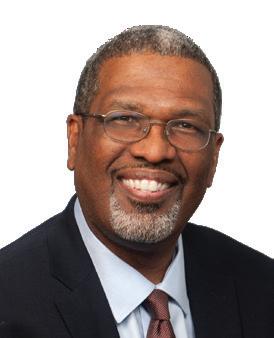
TheU.S. Department of Energy (DOE) is proud to announce the Historically Black Colleges and Universities (HBCU) Clean Energy Education Prize. This competition, with $7.75 million in cash prizes, will help HBCUs develop programming to strengthen the participation of K-12 and community college students in STEM and other associated fields that can lead to potential careers in clean energy industries. It will also give HBCUs the opportunity to create curricula and program enhancements that provide opportunities for undergraduate and graduate students and establish partnerships that lead to career opportunities in clean energy. This prize supports President Biden’s Justice40 Initiative, which directs 40% of the overall benefits of certain Federal investments to flow to disadvantaged communities by helping to build a diverse STEM pipeline to support the clean energy transition. This prize differs significantly from other traditional funding typically offered by DOE and other government agencies. We want HBCUs to be able to create and control their own vision of a clean energy ecosystem and student pipeline (without direction from DOE), from K-12 through college and into industry. The department will provide resources and funding to jump start each institution’s vision of how they can provide a pathway for students to move toward long-term careers in fast growing clean energy industries, such as renewable power, sustainable transportation, grid/energy storage, industrial decarbonization, and energy efficiency of buildings. And we will encourage them to be as innovative as possible in creating the partnerships and formulas necessary to produce effective pathways toward awareness and potential career paths in clean energy.
The HBCU Clean Energy Education Prize will be broken down into two different tracks. The first will provide HBCUs an opportunity to create programming for K-12 and community college students to expose them to clean energy technologies and careers. This can potentially include summer camps devoted to exposing
concepts within clean energy technologies and applications. The second track will challenge HBCUs to create partnerships with other academic institutions that offer advanced programming in clean energy fields and expand their own programming and curricula through those partnerships. This track aims to encourage new crossinstitutional relationships without having to create expensive new programs. We are looking for HBCUs to forge alliances with other academic institutions already specializing in certain clean energy topics. Imagine[HJ1] [MT2] any HBCU in your community being able to forge new partnerships and send their graduates on to top master’s and Ph.D. programs across the country that already have strong programs with a focus in clean energy related areas.
With $7.75 million in cash prizes, this competition will help HBCUs develop programming to strengthen the participation of K-12 and community college students in science, technology, engineering, and math (STEM) fields.
Together, these two tracks will ultimately help HBCUs create stronger industry connections in the clean energy space. From a pipeline perspective, what we’re aiming to produce is an initial spark with K-12 and community college students to influence and move them toward clean energy industry careers. The hope is that when they gravitate back toward their local HBCU where they attended the summer camps, and eventually graduate
from a program at these institutions with enhanced STEM programming, the clean energy career track will be clearer than ever. It will also be well-marked so that students can either pursue advanced degrees at partnering colleges or go to work directly in one of the fast-growing clean energy industries. The latter will require new companies and industry professionals to conduct stronger recruitment on these great campuses and become more aware of the unique programs happening at HBCUs. HBCUs only account for 3% of U.S. Colleges but produce 25% of all Black STEM graduates. If we aren’t able to influence this important group of students to think about pursuing clean energy careers, we won’t be able to diversify the future workforce enough to meet the huge demand that will be required for this country’s continued clean energy transition. With the HBCU Clean Energy Education Prize, DOE hopes to better equip minority-serving institutions with the resources and infrastructure they need to train a critical portion of the growing clean energy workforce.
The clean energy transition is happening now and will continue to do so in the months and years ahead. However, the transition will not be as effective as it can be if diverse representation is not at the table, and that is where we need the help of HBCUs. We want to make sure we get the word out about the Clean Energy Education Prize to all of them. Any HBCU looking to expose students to these potential careers can apply. Enlisting these institutions, and the ideas, perspectives, and expertise of their networks, can help the U.S. grow a strong, representative STEM workforce and improve the research quality and innovation needed to accelerate the field of clean energy. To learn more about the HBCU Clean Energy Education Prize, visit Herox.com/HBCU. To learn more about EERE’s DEIA efforts, visit energy.gov/eere/diversity-equity-inclusionand-accessability-stem-eere. S
The 37th annual BEYA STEM Conference was a huge success, leaving a lasting impression.
The theme of this year’s event was “Becoming Everything You Are,” which was evident throughout the conference. With diverse programs ranging from recognition events to professional development seminars, the conference allowed attendees to network, learn new skills, and make an impact in the STEM community.

Everyone was focused on impacting and leaving a lasting legacy in the STEM community, from the keynote speakers to the exhibitors. Attendees were inspired to strive for excellence and push the boundaries of what is possible. This event marked the first full, in-person BEYA STEM Conference since the pandemic, and it was a much-awaited reunion. From the recognition events to the professional development seminars, the conference offered a diverse range of programs that catered to the interests and aspirations of all participants.
The K-12 section of the conference looked a little different this year. For the first time, the BEYA Conference took place over two weekends, with weekend one covering the K–12 events. On February 2–4, 2023, BEYA launched the Metaquake Symposium by bringing educators, researchers, business professionals, artists, gamers, and even novelists to explore and learn more about the metaverse. The three-day event was held at the Omni Hotel in Washington, D.C.
Career Communications Group’s US Black Engineer & Information Technology magazine, Lockheed Martin Corporation, and the Council of Engineering Deans of the Historically Black Colleges and Universities hosted a conference that inspired attendees to unlock their full potential.

make careers in video gaming, and even changing the music industry through the metaverse. The weekend included interactive exhibits, hands-on activities, and presentations from industry professionals aimed at inspiring the next generation of STEM professionals.
DAPCEP (Detroit Area Pre-College Engineering Program) traveled from Detroit to Washington, D.C. to attend the first BEYA Metaquake Symposium weekend.
On top of the seminars, hands-on workshops were available for those who wanted to stop in to work on their resumes, get new headshots, and even conduct mock interviews.
Over 1,200 students from different areas attended the event. It was great to see young students engaged and excited about STEM, learning how they can
Attendees had the opportunity to participate in various professional development seminars that focused on enhancing skills, learning new techniques, and gaining valuable insights into the industry, and served as an excellent opportunity for attendees to learn from experts in the STEM field. The seminars were designed to cater to different interests and needs, from technical sessions on artificial intelligence and machine learning to leadership development workshops. Topics covered included AI, blockchain technology, and cyber security. The speakers were engaging and knowledgeable, and attendees left the seminars with new skills and insights that will help them make an impact in their careers.
CAREER FAIR AND JOB RECRUITMENT
The recruitment event was also a major highlight of the conference. The job fair was packed with top employers in the STEM field, all eager to connect with talented individuals looking to make an impact in their industries. Attendees had the opportunity to network with representatives from companies such as SpaceX, NASA, the U.S. Army, and Walmart, to name just a few.
Walmart also hosted an HBCU Village inside the Career Fair floor. Adding some flare to the theme, Walmart brought rhythm to the halls of the Gaylord National by inviting Howard University’s Drumline that Saturday afternoon for a showcase. Attendees watched, danced, and marched along with the show.
BEYA RECOGNITION EVENTS
The recognition events were a highlight
Hundreds of industry stars were recognized at the annual Technology Recognition Awards, where companies celebrated some of their best and brightest employees.
of the conference. Hundreds of industry stars were recognized at the annual Technology Recognition Awards, where companies celebrated some of their best and brightest employees.

The BEYA awards ceremony honored outstanding professionals in STEM fields who are making a difference in
their industries. The award recipients were truly inspiring, and their speeches left a lasting impact on everyone in attendance.
Dr. Colin Parris’ acceptance of the Black Engineer of the Year Award was a moving moment at the BEYA event. Parris is a well-known innovator in the tech industry, and his contributions to the field have been remarkable. During his acceptance speech, he highlighted the importance of diversity and inclusion in STEM and urged young professionals
The recruitment event was also a major highlight of the conference. The job fair was packed with top employers in the STEM field, all eager to connect with talented individuals looking to make an impact in their industries.
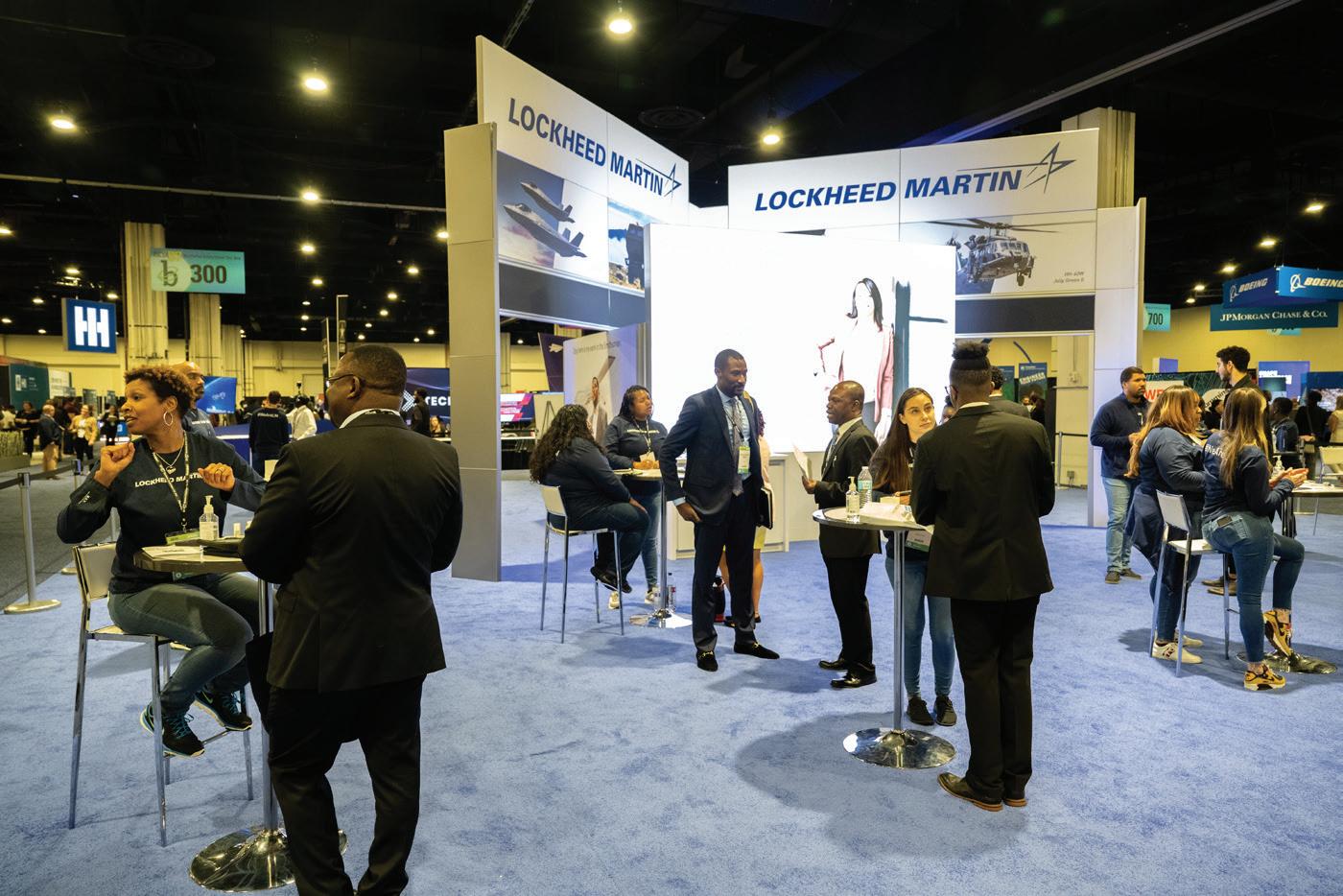
to embrace their uniqueness and pursue their dreams fearlessly. He also stressed the need for mentorship and encouraged established professionals to help guide the next generation of STEM leaders. Parris’ acceptance speech was a true inspiration and reminded everyone in attendance of the importance of making an impact and leaving a legacy.
Overall, the 2023 BEYA event was a tremendous success. Everyone in attendance felt the impact and legacy of the conference, and it was clear that BEYA had once again created a culture that made people want to return year after year. Whether you are a student, a young professional, or a seasoned veteran in the STEM field, there is something for everyone at BEYA STEM Conference. We can’t wait to see what BEYA has in store for next year’s event. S
Artificial intelligence (AI) is a hot-button topic, but we’ve used AI for years in intelligent home apps, rideshare apps, fitness trackers, chatbots, and facial recognition. The University of San Diego Online recently compiled a list of the “20 AI Courses, Certificates & Certifications” you should consider for career advancement. However, US Black Engineer thinks having an AI certification is like a driver’s license for the digital era. Everyone should have one. In addition to the list, San Diego also includes reasons we should take AI courses and certifications and where AI is being used today. According to the San Diego report, no matter where you begin your AI journey, there’s a course for you. US Black Engineer has compiled a list of entry-level courses, certifications, and certificates. Many of them are on Coursera, Udemy, edX, and Udacity.

Careers in Artificial Intelligence
> Job Horizon
Want a career in artificial intelligence? Here’s what you need to know.
Artificial intelligence (AI) is a field of computer science that focuses on creating intelligent machines that can perform tasks that typically require human intelligence. These machines can learn from experience and adjust their behavior based on the data they receive. AI is revolutionizing industries in seemingly all sectors, including healthcare and finance. As a result, the demand for skilled professionals in this field is skyrocketing due to the increased demand for and applications of this cutting-edge technology. By 2030, AI could contribute up to $15.7 trillion to the global economy, more than India and China's combined economic contributions, according to the Global Artificial Intelligence Study by PricewaterhouseCoopers.
AI can transform many areas of our lives, from healthcare and transportation to finance and manufacturing. Industries that AI is impacting heavily include:
Healthcare: AI is used to diagnose diseases and develop personalized treatment plans. Machine learning algorithms can analyze medical images and identify patterns that indicate disease, while natural language processing can help doctors interpret clinical notes and patient records.
Transportation: Self-driving cars are one of the most well-known applications of AI in transportation. These cars use sensors and machine learning algorithms to navigate roads and avoid obstacles. AI is also being used to optimize traffic flow and reduce city congestion.
Finance: AI is used to detect fraud and identify investment opportunities. Machine learning algorithms can analyze large datasets and identify fraudulent activity patterns. At the same time, natural language processing can help analysts interpret news articles and social media posts to make informed investment decisions.

Manufacturing: AI is used to optimize manufacturing processes and improve product quality. Machine learning algorithms can analyze data from sensors on production lines to identify potential issues before they cause downtime or defects. However, AI-powered robots can also perform too dangerous or difficult tasks for humans.
AI professionals typically earn more than the average salary in other IT professions due to the high demand and specialized skills required for AI roles. According to Payscale, the average salary of an AI professional in the United States ranges from $69,000 to $165,000 annually, with a median salary of $113,000 annually. Furthermore, the demand and compensation for AI professionals will likely continue to increase over the next 10 years.
AI Engineer/Developer: An AI engineer/developer is responsible for designing, developing, and deploying
By 2030, AI could contribute up to $15.7 trillion to the global economy.
AI-based applications. They create algorithms and systems that enable machines to learn and make decisions. Everyday tasks for an AI engineer/ developer include creating machine learning models, designing neural networks, and building natural language processing systems.

Data Scientist: A data scientist is responsible for extracting insights from data and using them to build AI models. They use statistical and machine learning techniques to analyze data and create models that can be used to make predictions and inform decisionmaking. A data scientist may work on a wide range of projects, from developing predictive models for healthcare to optimizing supply chain management for retailers. According to Glassdoor, the average salary for a data scientist in the U.S. is around $113,000 per year.
Machine Learning Engineer: A machine learning engineer is responsible
for designing, developing, and maintaining machine learning systems. They use algorithms and statistical models to build systems that can learn and improve over time. A machine learning engineer may work on various projects, from developing algorithms enabling self-driving cars to building predictive financial service models. According to Glassdoor, the average salary for a machine learning engineer in the U.S. is around $114,000 annually.
AI Researcher: An AI researcher is responsible for developing new AI technologies and techniques. They conduct research to improve existing algorithms and create new ones that can solve more complex problems. Some of an AI researcher's most common research areas include natural language processing, computer vision, and robotics. The average salary for an AI researcher is around $130,000 per year.
Engineer: An NLP engineer is responsible for developing systems that can understand and process human language. They use AI techniques to analyze and interpret text and speech and create systems that can naturally interact with humans. An NLP engineer may work on various projects, from developing chatbots for customer service to building voice assistants for smart homes. The average salary for an NLP engineer is around $135,000. The impact of AI on our daily lives will likely continue growing as technology advances and becomes more widespread. As AI becomes more integrated into our daily lives, the demand for skilled professionals in this field will only increase. If you enjoy working with advanced software and being on the cutting edge of industries, consider preparing for a career with AI!
S
AI professionals typically earn more than the average salary in other IT professions.
Here's what you need to know.
The AI industry is rapidly growing, and many job opportunities are available in various sectors and geographic areas across much of the United States. Virtual work allows job seekers to be employed from their current location for companies based in traditional technology hot spots. Looking for a specific sector to align your skills and goals while also focusing on a career in AI? Consider the following areas of employment:
Technology companies such as Google, Amazon, Facebook, Microsoft, and IBM are among the top employers in the AI industry. These massive companies constantly develop and implement AIbased systems, requiring a range of AI professionals.
The healthcare industry utilizes AI technology, with applications ranging from drug discovery to medical imaging analysis. AI-based systems can help improve patient outcomes, increase efficiency, and reduce costs.
The financial services industry—such as banks, insurance companies, and investment firms—uses AI-based systems for fraud detection, risk analysis, and investment management.
Manufacturing companies use AIbased systems for quality control, predictive maintenance, and supply chain optimization.
Governments also invest in AI technology for various applications, including national security, public safety, and health care.
AI technology is also used in education to develop personalized learning systems, intelligent tutoring systems, and educational games.
Startups also play a significant role in the AI industry, with many new companies developing innovative AI-based systems for various applications.
If you are interested in pursuing a career in AI, consider the following tips to help prepare you for your future career.

Most AI jobs require a bachelor's or master's degree in computer science or a related field, such as mathematics or engineering. A degree in computer science will give you a solid understanding of programming languages, data structures, algorithms, and other essential concepts in AI. Machine learning is a crucial component of AI, and many AI jobs require expertise in this area. Job seekers should take machine learning, data science, and statistics courses to learn the necessary skills. Online courses and tutorials are available, and many universities offer machine learning and data science courses.
Practical experience is a great way to learn AI. Participate in projects that involve AI development or implementation. Join AI clubs or attend AI-related events to gain exposure to the field. Internships and co-op programs can also provide valuable hands-on experience. Specializing in a specific area of AI can help you develop expertise and stand out from other candidates. Determine which area interests you the most and focus on gaining in-depth knowledge in that area. Seek internships or other events that focus on your specialization.
AI is a rapidly evolving field, and new technologies and techniques are being developed daily. Stay current on the latest trends and developments by reading research papers, attending conferences, and following AI experts on social media. Keeping informed on the latest advancements will help you stay competitive in the job market.
A strong portfolio of projects and accomplishments can help you stand out in the competitive field of AI. Create projects demonstrating your AI skills and abilities, such as building a chatbot or developing a recommendation system. Show your work on your resume, LinkedIn profile, or professional recruitment website.
While technical skills are crucial in AI, soft skills are also important. AI professionals must communicate effectively with team members, stakeholders, and clients. They also need to be able to think creatively and solve complex problems. Develop soft skills such as communication, critical thinking, and teamwork to excel in an AI career. You will need technical and soft skills to enter the field and enjoy continued success. Here are a few important skills required for a career in AI: Programming proficiency in at least one programming language, such as Python, Java, or C++. You should be able to write code and develop algorithms that can be used to build AI systems. Familiarity with frameworks like TensorFlow or PyTorch can be helpful in machine learning or deep learning applications.
MOST AI JOBS REQUIRE A BACHELOR'S OR MASTER'S DEGREE IN COMPUTER SCIENCE OR A RELATED FIELD, SUCH AS MATHEMATICS OR ENGINEERING.
A solid understanding of machine learning concepts and techniques such as supervised and unsupervised learning, reinforcement learning, and deep learning. You should be able to apply these techniques to build models that can recognize patterns in data and make predictions based on them.
A strong foundation in statistics and mathematics. You should be able to use statistical models and techniques to analyze data and build AI models. Knowledge in linear algebra, calculus, and probability theory can help understand the underlying mathematics behind AI models.
Combining a college degree, practical experience, technical skills, and key soft skills such as problem-solving will ensure that a college student or job seeker is abundantly prepared to enter the field of AI and chase the futuristic jobs of tomorrow! S




THE NEXUS OF TRADITION + RESEARCH
The partnership between Florida A&M University & Florida State University empowers us to be a leading HBCU producer of engineering doctoral degrees to AfricanAmericans, with the highest level of external research funding.

FAMUFSU.engineer
BACHELOR DEGREES
Biomedical Engineering
Chemical Engineering
Civil Engineering
Computer Engineering
Electrical Engineering
Environmental Engineering
Industrial Engineering
Mechanical Engineering
MASTER’S DEGREES
Biomedical Engineering
Chemical Engineering
Civil Engineering
Electrical Engineering
Engineering Management
Industrial Engineering
Mechanical Engineering
Sustainable Energy Systems Engineering
DOCTORAL DEGREES
Biomedical Engineering
Chemical Engineering
Civil Engineering
Electrical Engineering
Industrial Engineering
Mechanical Engineering Materials Science

Programs offered through the Clarence M. Mitch School of Engineering support access to enhance learning experiences and professional opportunit


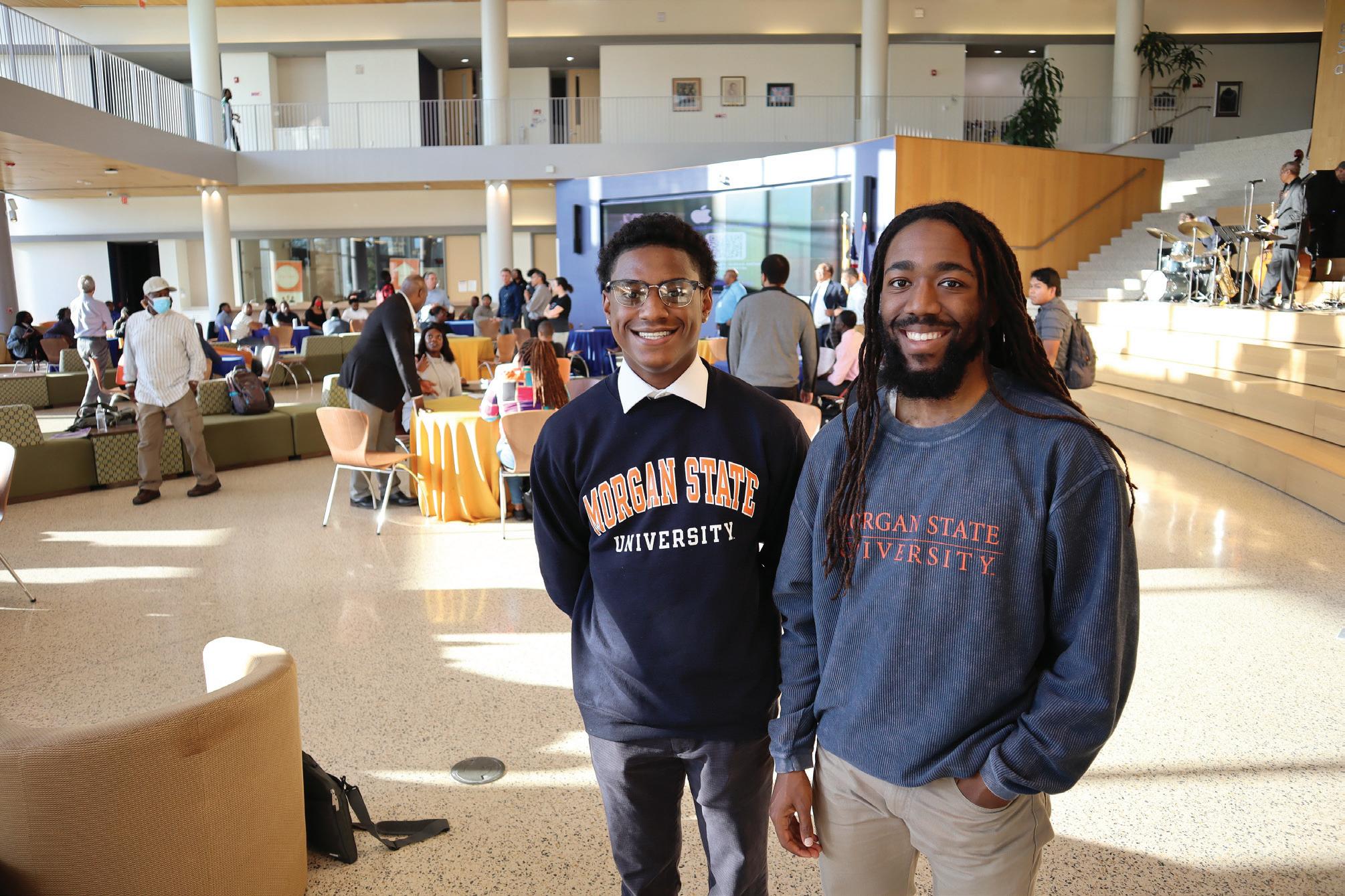
Graduates are well-prepared to enter industry or advance their education with post graduate studie
Civil Engineering
Sustainable Urban Environmental Engineering
Electrical Engineering
Industrial Engineering
Mechatronics Engineering
Transportation Systems
Transportation Systems Engineering
Master's Programs
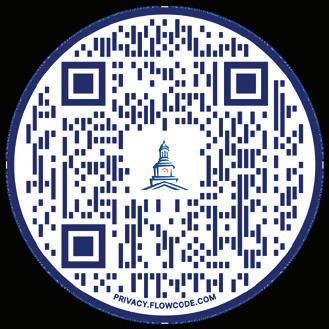
Urban Transportation
Electrical Engineering
Master of Engineering
Sustainable & Resilient Infrastructure Engineering
Computer and Electrical Systems Engineering
Transportation and Urban Infrastructure Systems
Industrial Engineering
Secure Embedded Systems
Doctor of Engineering
We see your greatest potential and your motivation to achieve. We see you at Norfolk State University.

Bachelor of Science
- Biology
- Chemistry
- Computer Science
- Nursing and Allied Health
- Mathematics
- Physics
- Engineering (Electrical and Optical) Technology
Master of Science
- Computer Science
- Cybersecurity
- Electronics Engineering
- Healthcare Administration
- Materials Science
Ph.D.
- Materials Science and Engineering
College of Science, Engineering and Technology Office of the Dean
700 Park Avenue | Norfolk, Virginia 23504 (757) 823-8180 | www.nsu.edu/cset
Master of Engineering
Master of Science in Biology
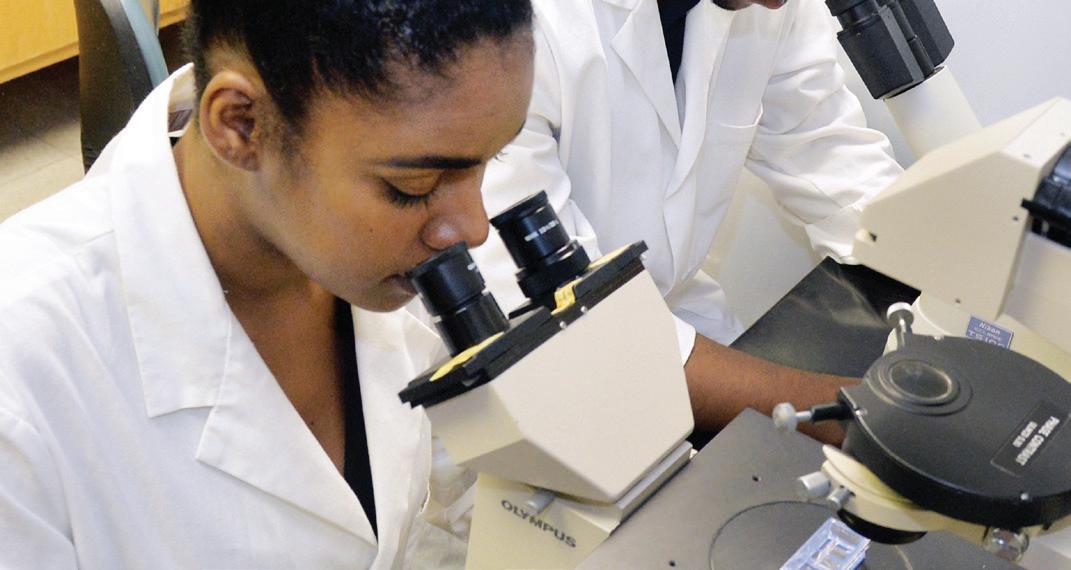
Master of Science in Computer Science

Master of Science in Mathematics
Master of Science in Physics


Ph.D. in Environmental Toxicology
Ph.D. in Science/Math Education





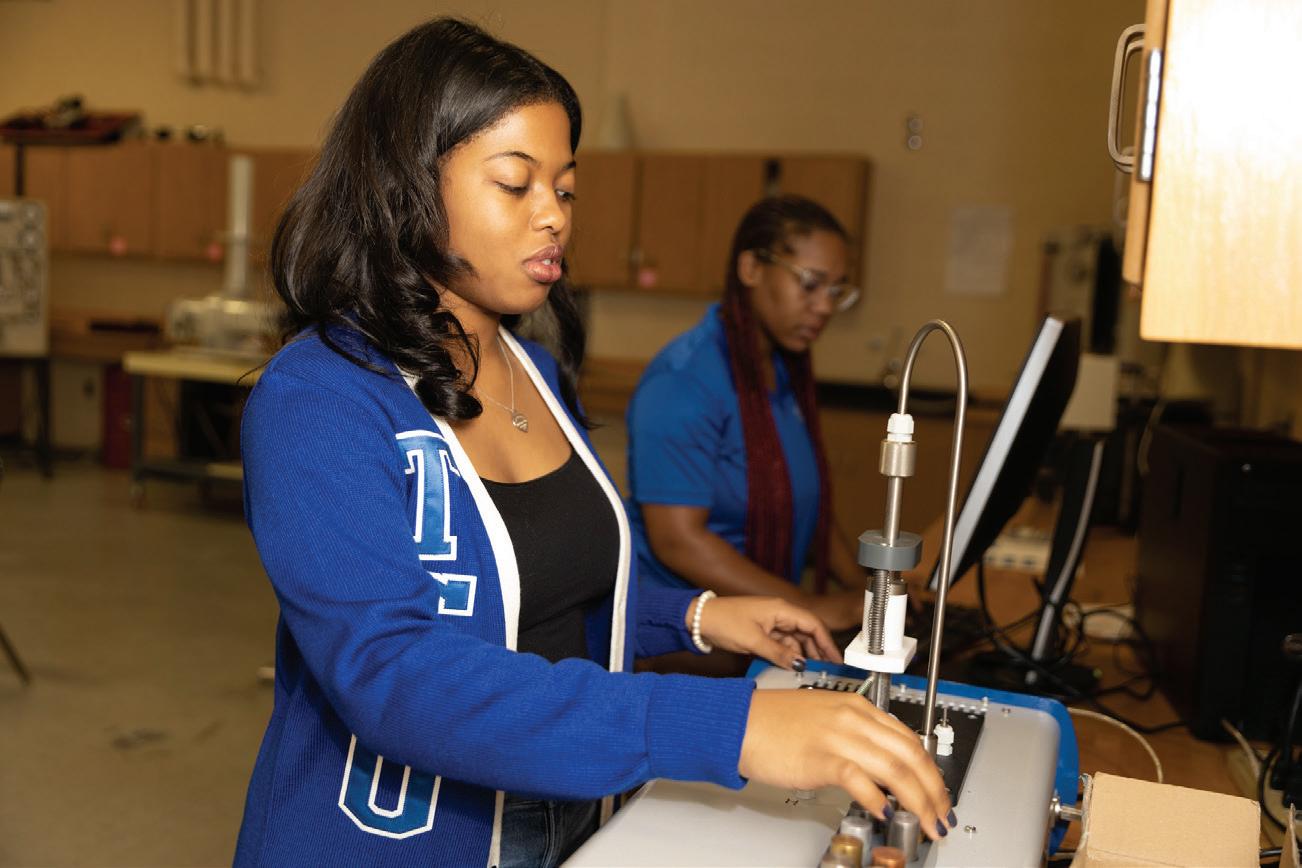
INSTITUTION
University of Maryland Eastern Shore (UMES), the state’s historically black, 1890 landgrant institution, emphasizes baccalaureate and graduate programs in the liberal arts, health professions, sciences and teacher education. In keeping with its land-grant mandate, the university’s purpose and uniqueness are grounded in distinctive learning, discovery and engagement opportunities in agriculture, marine and environmental sciences, technology, engineering and aviation sciences, health professions and hospitality and tourism management. Degrees are offered at the bachelors, masters and doctoral levels.
OVERVIEW
The School of Business and Technology includes five academic departments: Business, Management and Accounting, Engineering and Aviation Sciences, Hospitality and Tourism Management, Mathematics and Computer Science and Technology, as well as one program – PGA Golf Management. The faculty members within the school are actively engaged in funded research and educational projects; many of which involve undergraduate programs.
Affirming the University of Maryland Eastern Shores’ role as the State’s 1890 land-grant institution by providing to citizens opportunities and access that will enhance their lives and enable them to develop intellectually, economically, socially, and culturally.
• Accounting
• Aviation Science
• Biomedical Engineering
• Business Administration
• Computer Science
• Construction Management Technology
• Engineering
• Engineering Technology
• Finance
• Hospitality and Tourism Management
• Marketing
• PGA Golf Management
• Technology and Engineering Education
• Master of Science in Applied Computer Science
• Master of Education in Career and Technology Education
• Master of Science in Cybersecurity Engineering Technology

• Master of Science in Data Science and Analytics Engineering
• Master of Science in Electrical and Mechatronics Engineering
• Doctor of Philosophy (Ph.D.) in Applied Computing and Engineering
Aerial Imaging and Remote Sensing for Precision Agriculture; Biofuels, Sustainability and Geospatial Information Technologies; Renewable Energy; Sparsity Aware Adaptive Radar Sensor Imaging; Structural Health Monitoring; Air-propelled Instrumental Robotic Sensory Platform Design and Development; Signal Processing for Detection and Monitoring of Electrical Power Signals; On-chip Optical Interconnected Computer Architecture.
FOR MORE INFORMATION:
Dr. Derrek B. Dunn, Dean
School of Business and Technology
30925 College Backbone Road | Princess Anne, MD 21853
Phone: 410-651-6067 Fax: 410-651-7829
ddunn@umes.edu | www.umes.edu/sbt/

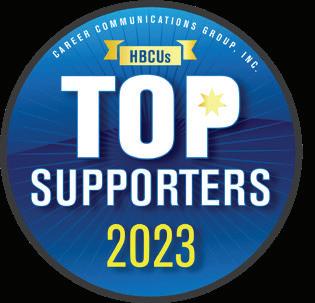

At Lockheed Martin, inclusion drives success. Diverse backgrounds, experiences and points of view help us create incredible work, solve customers’ toughest challenges and engineer solutions around the world. We don’t know what’s going to change the world next. But we’re probably already working on it. Learn more at lockheedmartin.com/careers
